#1970s does 1920s
Text
okay Riverdale post simulator go

🖋️ narratorconfessions follow
hey guys i've been feeling pretty bored with the way this narrative has been unfolding tbh... what situation should i put my friends into next? haha
15 notes

🪓 dancinginthedark-mp3 follow
Does anybody else feel the Darkness encroaching?
🪓 dancinginthedark-mp3 follow
You guys seem to think I am joking. This is not a joke. It is in the room with me.
🪓 dancinginthedark-mp3 follow
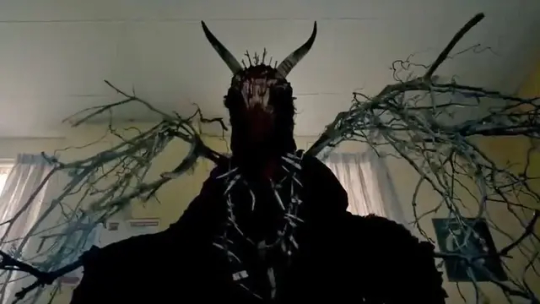
Honestly it is off-putting in a fashionable way. What do you guys think?
30k notes

💋 livinghauntedhouse follow
haters will say my delusions are negatively impacting my life but all this lesbian sex i'm having suggests otherwise. it's all about the Gothic Femme mindset, you lumpen ne'er-do-wells.
208 notes

🎵 notsoallamerican follow
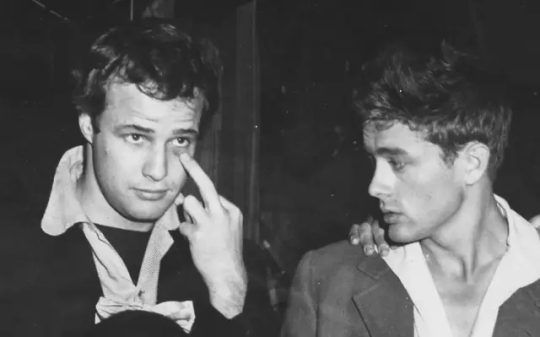
I really admire their friendship! Wish my guy friends wanted this same type of bond
🎭 offbroadwaybound follow
they were both bisexual and without a doubt fucking
🎵 notsoallamerican follow
What's bisexual???
3 notes

💎 designerbeauty follow
I'm just a classy woman looking for the Eduardo to my Mark. Literally WHAT is so unreasonable about this...
80 notes

💻 jugheadofficial follow
It's really hard being a sensitive straight guy. I love my friends, but they just can't understand what my life is like. New novel idea maybe? :/
🎵 notsoallamerican follow
Jughead :(
💋 livinghauntedhouse follow
can you invent a real problem you ghoulish closet case? some of us were sent to conversion therapy
💻 jugheadofficial follow
How did you do this to my post?
-1k notes
#riverdale#jughead jones#betty cooper#cheryl blossom#archie andrews#kevin keller#veronica lodge#a day in the life
614 notes
·
View notes
Text
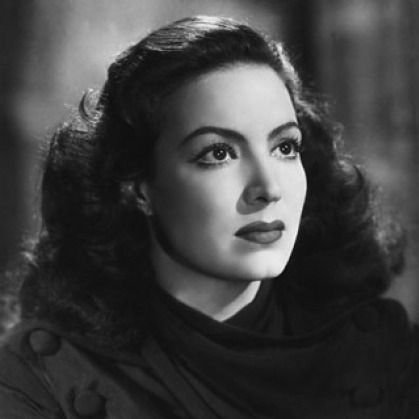

Propaganda
María Félix (Doña Barbara, La Mujer sin Alma, Rio Escondido, La Cucaracha)—Maria Felix is still possibly the most well-known Mexican film actress. She turned down multiple-roles in Hollywood and a contract with Metro-Goldwyn-Meyer in order to take roles in Mexico, France, and Argentine throughout the 1940s, 50s, 60s. She was so famous and so respected as a dramatic actress that she inspired painters, novelists and poets in their own art--she was painted by Diego Rivera, Jose Orozco, Bridget Tichenor. The novelist Carlos Fuentes used her as inspiration for his protagonist in Zona Sagrada. She inspired an entire collection by Hermes. In the late 1960s Cartier made her a custom collection of reptile themed jewels. She considered herself to be powerful challenger of morality and femininity in Mexico & worldwide--she routinely played powerful women in roles with challenging moral choices and free sexuality. But even still, years after he death, she is celebrated with Google Doodles, and appearances in the movie Coco, and holidays for the anniversary of her death.
Maureen O’Hara (The Parent Trap, The Quiet Man)—They called her the Queen of Technicolor. That right there should help introduce people to the fiery, wonderful, stunning Maureen O’Hara. She was from Ireland, born in 1920, and started in theater at the age of ten. At 15, she was winning drama awards, including one for her performance as Portia in the Merchant of Venice. At 16, she was the youngest pupil to graduate from the Guildhall School of Music. By 18, she transitioned to film, starting off with a bang alongside Charles Laughton in Hitchcock’s Jamaica Inn, and proceeded to work steadily up through the early 1970s. She was in adventures and comedies and romances, spent a lot of time in westerns giving merry hell to John Wayne (and less merry hell to the indomitable John Ford — she held her own even when he was verbally abusive and demeaning to her). She was in The Quiet Man, which was the first American-made film entirely filmed in a foreign country. She helped make American Christmas what it is with Miracle on 34th Street. She played a lineup of headstrong, forthright women second only, perhaps, to Katharine Hepburn. She was married three times, lived for a while with a boyfriend in Mexico, sued for custody of her daughter in the 1950s, AND sued a magazine for libel in the same era. After mostly retiring from acting, she edited a magazine. She eventually sold the magazine to spend more time with her grandson, but even then ran a ladies fashion store. She was an outspoken, brilliant, passionate lady, with amazing red hair, a career to envy, and — well — that face!
This is round 2 of the tournament. All other polls in this bracket can be found here. Please reblog with further support of your beloved hot sexy vintage woman.
[additional propaganda submitted under the cut]
María Félix:

She's Thee Hot Vintage Movie Woman of México. She's absolutely gorgeous and always looks like she's about to step on you. you WILL be thankful if she does.
"María Félix is a woman -- such a woman -- with the audacity to defy the ideas machos have constructed of what a woman should be. She's free like the wind, she disperses the clouds, or illuminates them with the lightning flash of her gaze." - Octavio Paz
María Félix is one of the most iconic actresses of the Golden Era of Mexican Cinema. La Doña, as she was lovingly nicknamed, only had one son, and when her first marriage ended in divorce her ex-husband stole her only child, so she vowed that one day she’d be more influential than her ex and she’d get her son back. AND SHE DID! María Félix rejected a Hollywood acting role to start her acting career in Mexico on her own terms with El Peñón de las Ánimas (The Rock of Souls) starring alongside actor, and future third husband, Jorge Negrete. She quickly rose to incredible heights both in Mexico and abroad, later on rejecting a Hollywood starring role (Duel in the Sun) as she was already committed to the movie Enamorada at the planned filming time. Of this snubbing she said, quote: “I will never regret saying no to Hollywood, because my career in Europe was focused in [high] quality cinema. [My] india* roles are made in my country, and [my] queen roles are abroad.” (Translator notes: here the “india” role means interpreting a lower-class Mexican woman, usually thought of indigenous/native/mixed descent —which she had interpreted and reinvented throughout her acting career in Mexico— and what abroad was typically considered the Mexican woman stereotype, with the braids, long simple skirts, and sandals. This also references the expectation of her possibly helping Hollywood in perpetuating this stereotype for American audiences that lack the cultural and historical contexts of this type of role which would undermine her own efforts against this type of Mexican stereotypes while working in Europe) She was considered one of the most beautiful women in the world of her time by international magazines like Life, París Match, and Esquire, and was a muse to a vast number of songwriters (including her second husband Agustin Lara,), artists, designers, and writers. Muralist Diego Rivera described her as “a monstrously perfect being. She’s an exemplary being that drives all other human beings to put as much effort as possible to be like her”. Playwriter Jean Cocteau, who worked with her in the Spanish film La Corona Negra (The Black Crown) said the following about her, “María, that woman is so beautiful it hurts”. Haute Couture houses like Dior, Givenchy, Yves Saint Laurent, Balenciaga, Hérmes, among others, designed and dressed her throughout her life. She died on her birthday, April 8, 2002, at 88 years old, in Mexico City. She was celebrated by a parade from her home to the Fine Arts Palace in the the city’s Historic Downtown, where a multitude of people paid tribute to her. Her filmography includes 47 movies from 1942 until 1970, and only two television acting roles in 1970. She has 2 music albums, one recorded with her second husband, Agustín Lara, in 1964 titled La Voz de María y la inspiración de Agustín «The voice of María and the inspiration of Augustín», and her solo album Enamorada «In Love» in 1998. Her bespoke Cartier jewelry is exhibited alongside Elizabeth Taylor’s, Grace Kelly’s and Gloria Swanson’s. In 2018, Film Director Martin Scorsese presented a restored and remastered version of her film Enamorada in the Cannes Classics section of the Cannes Festival and Google dedicated a doodle for her 104th birthday. On august 2023 Barbie added her doll to the Tribute Collection.

Maureen O'Hara:
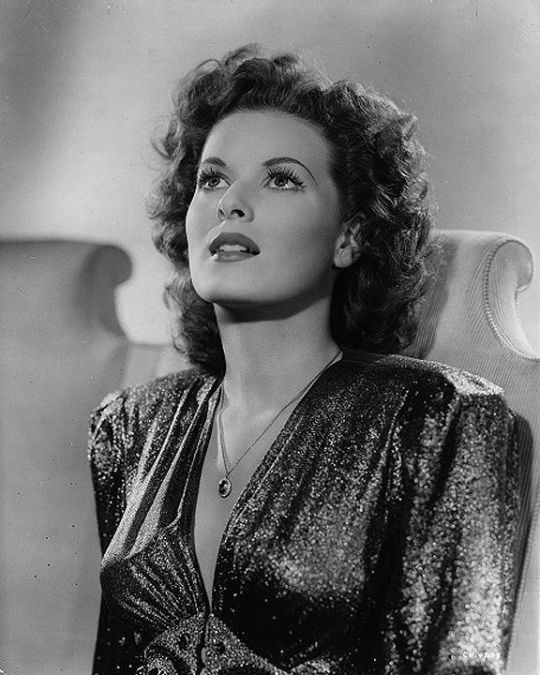
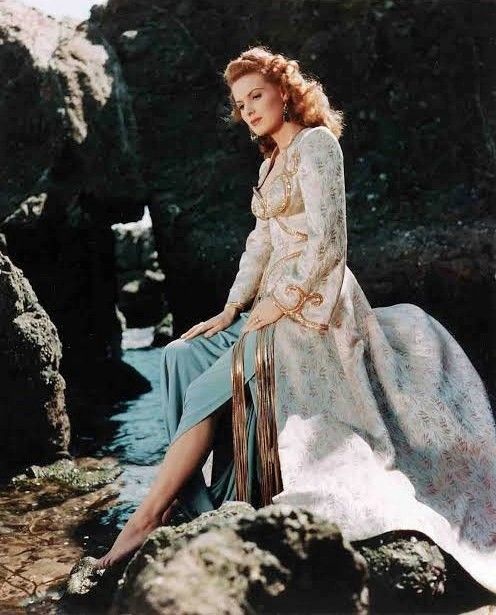
I thought she was one of the most beautiful women in the world when I was a kid and I have yet to really change my mind. Always loved her temper and her red hair. Plus she was kind of a MILF in The Parent Trap

Haughty, red hair, hot.
I would have to give up my passport if I didn't submit Maureen O'Hara but also have you seen her? Not only did she look like that (she was called the Queen of Technicolor, though she wasn't a big fan of that sobriquet), she was also very funny and tough as nails. She faced off against Walt Disney in a contract dispute and the legend goes that when someone mentioned her at his deathbed, he sat up and said 'That bitch!'. Her comment on that story is "At least he didn't think of me and say, 'That wimp'." She struggled to get serious roles for a time, saying ""Hollywood would never allow my talent to triumph over my face," so she plays the sexy princess/pirate/harem girl in a LOT of early movies that she referred to as "Tits and Sand" films, she being the tits in question. She also turned down so many leading men and studio bosses (Errol Flynn and Howard Hughes are among her rejects) that there were rumours spread that she was a lesbian. Many egos were battered it seems. I'm including the infamous Lady Godiva scene in the photo propaganda for the sheer Moment of it [link] . It was a bit of a flop critically, but it was one of Clint Eastwood's first film appearances and she said he told her later that he was very glad of the money at the time.
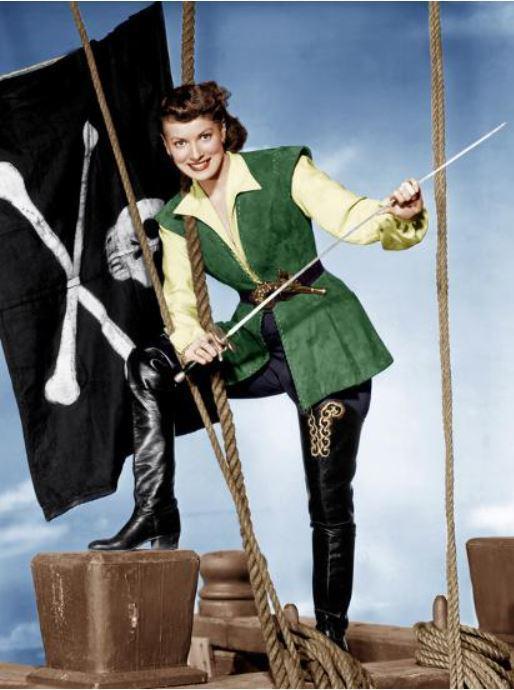

She was a very proud Irish woman and when she went for her American citizenship they insisted on referring to her as British (the timeline of Irish independence is a bit wibbly wobbly, we won't get into it here). She refused to accept American citizenship under that condition and argued her way through every level of US immigration she could find, supposedly saying "I'm not responsible for your antiquated records here in Washington", until a judge finally gave up and said "Give her what she wants, just get her out of here". This made her the first ever person seeking US citizenship to be proclaimed Irish on the record!
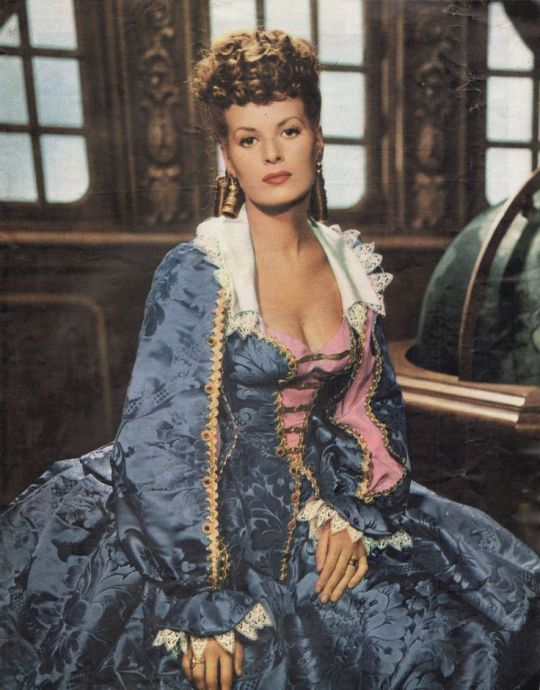
The hair. The accent. The figure. The acting chops. The perfection.

170 notes
·
View notes
Text
Better Bones AU: History Lesson
(A new, updated version of an old history lesson, with some new names and the hopes of being a better summary. Refer to this one over the old one!)

[ID: Ferncloud from Warrior Cats is lecturing Lionkit, Jaykit, and Hollykit.]
Teaching history in the Clans became an important feature after the defeat of Ripplestar near the beginning of the Chivalric Period. While elders are seen as the chroniclers of history, a dedicated Educator takes on the role of making sure each litter learns everything they need to know.
During the Settlement Era, ThunderClan's educator Ferncloud teaches the kits of ThunderClan about glyphs, the basic tenets of the Warrior Code, and an overview of history.
As of the newest arc, there have been 5 Periods so far, with each period being broken down into 3 Eras and side stories. Those are;
ANCIENT PERIOD
Dawn Era, Code Era, Skyfall Era
CHIVALRIC PERIOD
Ripple Era, Crusade Era, Campaign Era.
THISTLE PERIOD
Broken Era, Tiger Era, Fire Era
HOMING PERIOD
Journey Era, Settlement Era, Eclipse Era
MODERN PERIOD
Reunion Era, Reckoning Era, Current Day
In addition, there is also a Prehistoric Period, which is only remembered by Clan cats through the tales of LionClan, LeopardClan, and TigerClan. The truth is even stranger than the mythological animals they tell stories about.
See: Hollyleaf's Century.
Ancient Period
(1920s - 1970s)
Dawn Era
Moth Flight's Vow
In the Dawn Era, the five ancient founders settled the Forest. From the North came the Clans, lead down from the mountains by Gray Wing the Wise. From the south came Warriors, following a king, Arc of the Park.
Gray Wing died in a fateful accident while saving his right-hand man, Shaded Flower. Clear Sky managed to keep the group together through his sheer strength, settling them into the forest. This all changed when a horrible accident caused the leg of Clear Sky's brother, Jagged Peak, to be permanently twisted.
His own brother and the leader of the Clan at the time, Clear Sky, cast him out. His pregnant mate, Bright Storm, protested this cruelty and tried to care for Jagged Peak all winter long. Her efforts were in vain as he starved to death, and the spirit of Gray Wing responded to this by sending her a hero and a sign;
Bright Storm's litter had one survivor, a ginger tabby named Thunder Storm, missing its leg in the same place where its uncle had lost his. They brought the child back to the group.
Refusing to learn his lesson, Clear Sky rejected the child just like he'd done to Jagged Peak. This time, many families did not abide the cruelty, headed by Tall Shadow. This caused the split between Sky's Clan and Shadow's Clan. Shadow's Clan came into constant conflict with the Wind Coalition, Thunder Storm broke off Thunder's Clan many years later after a great injustice, and he eventually struck up an alliance with the River Kingdom.
Rising political tension culminated in Sky's Clan taking the prince of the River Kingdom, River's Ripple, as a hostage. The First Battle broke out between all five groups at Fivetrees, a bloodbath with so much carnage that the bodies could not be buried in one day.
StarClan broke the battle with a flash of lightning, coming down from the heavens to offer each leader a revelation, and a reward. The reward being that each leader would get 9 lives to lead their Clans, and better understand the cats within them, as long as they gave a proper burial to each cat killed in the pointless fight.
The first two Commandments of the Warrior Code were made on this day-- the Law of the Land establishing borders, and the Law of Honor, which states that a true warrior does not need to kill in order to win their battles.
And thus ended the Dawn Era, and started the Code Era.
Code Era
Because this was before the Clans taught history, most of the Code Era is remembered in parables associated with the creation of Commandments 3 thru 8. It's also MUCH longer than most other Eras, with many of these parables being several generations apart.
The cats in them are so old and so storied that they are seen as deities in StarClan, prayed to and invoked by the living. Examples being Daisytail, Patron of Protection and Parenthood, and Redscar, Patron of Arbitration and Decision-Making.
Eventually, the third commandment, the Law of Loyalty, was made in response to the open love of Ryewhisker and Cloudberry. It banned interclan mateships and closed off the groups in a way unseen since the Dawn Era, and ignited the ancient tradition of Kitten Stealing.
Unknown to the living, in protest of such an evil law, Ryewhisker and Cloudberry willingly joined the Dark Forest. They are two of the oldest spirits there.
An accurate chronicle truly begins with the Skyfall Era.
Skyfall Era
Cars, brand new highways, and suburban expansion started to cut into the Forest as the humans entered a new era... not that the Clans knew why it was happening. Kittypets, associated with these humans, started to be seen more negatively than ever before.
This Era is named for, and defined by, the loss of SkyClan.
Commandment 9, the Law of the Wild, was made in response to SkyClan cats defecting to live as housecats; "A true warrior rejects the soft life of a kittypet."
As their territory evaporated below their paws, SkyClan was blamed for everything out of their control. To this day, this era is framed as a cautionary tale to kittens, "What happens to a Clan when they stop living by the Code." In a famous final plea, SkyClan was turned away and exiled.
Their ancestors, 1/5th of StarClan, went with them... except for Skystar who remained in Silverpelt, revered as a Patron of Battle.
The Clerics of the four remaining clans protested the exile ferociously, banding together to go on strike until SkyClan was returned. To break it and bring their medics back under control, the Medicine Cat's Vow was codified into law.
Previously, it had been a personal vow between Clerics, one with no enforcement behind it. Not taking a mate or having kittens was to always keep medicine above Clan loyalty; but the code was enshrined to make a Cleric put Clan loyalty above all else. A corrupted vow. Dalestar of WindClan smeared his Cleric, Larkstripe, as a hypocrite and sent her kitten away.
See: Larkstripe
And thus ended the strike, and the Ancient Period, as the following Chivalric Period began.
Chivalric Period (1970s - Late 1990s)
Ripple Era
Ripplestar's Rot
Larkstripe's kitten was raised at Birdsong's belly in ShadowClan, the adopted brother of Gorseclaw and Spottedpelt. Ripplemoon understood it was a great injustice that SkyClan had been exiled, and vowed to make room for his siblings' father and Clan to return home.
Meanwhile, the 5th Oak at Fivetrees was beginning to rot. The Ripple Era was named for this time of tumult, ending with a crash as Ripplestar's war came to a bloody halt.
After the death of the 5th Oak, Fivetrees becomes Fourtrees, widely considered a sign that a Clan that cannot keep its borders does not deserve to have them. THREE new laws were added to the Warrior Code, all of them related to making cats more loyal.
The Full Moon Truce, ruling that cats were not to fight or argue at gatherings
The First Tasks, a set of pre-existing traditions now codified, that all apprentices had to complete upon becoming warriors
The Leader's Rights... to not be disobeyed.
The Clan Pride Tide that followed ignited war and chaos, considered to be the 'chivalric ideal' of Clan society. The battles were glorious, and never before were cats so honorable and ferocious. Punishments were harsh and severe... such as the one for a certain mother who took a halfclan mate, and was given 3 ill-fated kittens by StarClan.
And this punishment truly ended the Ripple Era, and lead to the Crusade Era.
Crusade Era
Darkstar's Commandment
Pinestar's Crusade
When a false sign from StarClan was misinterpreted by the Cleric of ThunderClan (unknown to all: Birchface was a rogue StarClan warrior who sent it), Oakstar ferociously exiled Mapleshade and her three kittens in the midst of a storm. With nowhere to go, she tried to bring her children across the river to their father's Clan. They did not survive.
Darkstar refused to even allow her to bury the kittens in RiverClan. Mapleshade exacted her revenge, taking out 3 cats before being taken out herself. Furious at the injustice and murder, StarClan damned every cat involved, and gave Darkstar and Oakstar a command; to NEVER let this happen ever again.
Darkstar created Darkstar's Commandment, that all kittens were to be protected regardless of origin, and no one would be compelled to reveal the other parent of their kittens. This is known as the Queen's Rights.
See: Queen's Rights
Oakstar opposed this change at first, until he was beaten by Darkstar and forced to accept this new law. Fearing that StarClan would be furious with him, he attempted to please them by starting crusades against the cats of Chelford.
These Crusades lead to the creation of BloodClan, to defend Chelford cats against Clan invasion. From this point it evolved into a system of governance unique to itself.
See: Brief BloodClan Guide
WindClan and ShadowClan joined in on these raids for several years, with only RiverClan abstaining. Between the cats of the forest there was an era of odd 'peace' as they had new targets to battle for honor... until Heatherstar took power.
The Campaign Era reignited inter-Clan hostility.
Campaign Era
Tallstar's Collapse
Brokenstar's Cataclysm
Stormpaw's Demon
Bluestar's Flowers
Heatherstar of WindClan flexed her ambition by launching a campaign to take the Mothermouth Moorland from ShadowClan, setting off a cascade of renewed inter-Clan hostility. It caused ShadowClan to hold territory from ThunderClan, ThunderClan to re-take Sunningrocks, and RiverClan to assert control over the Gorge, causing periodic four-way fights between them in ways unseen since the Ripple Era.
WindClan lost the tradition of tunneling in this Era; as it isn't useful for the total war that Heatherstar needed to take such a huge chunk of territory.
In the later half of this Era, a group of young cross-Clan friends started to meet in secret. Bluemoon of ThunderClan, Hoprunner and Ashfoot of WindClan, Lizardstripe of ShadowClan, Oakheart of RiverClan, and Barley Senior of BloodClan.
They called themselves the Forget-Me-Nots, and it was the beginning of the ideology known as Fire Alone. Bluemoon's love of her friends, and the loss of her family in pointless battles, made her realize that something needed to change.
And yet, this era gave birth to something much more rotten. As the Clans hardened and started to see the more brutal parts of the code as fundamentally opposed to its softer laws, the tenets that would found Thistle Law began to form.
See: Thistle Law
Named for a painful lesson that Thistleclaw taught his apprentice, Bluestar's rise to power stalled its implementation for a few more safe years. It was the ironic negotiation of a Peace Deal to end the Mothermouth Moorland war which ended the Chivalric Period, and birthed the Thistle Period.
Thistle Period
(Late 1990's - 2008)
Broken Era
Spottedleaf's Plague
After generations of fighting, Raggedstar of ShadowClan was old, tired, and wanted only to see peace for his last years of life. He went to end the war and stop fighting for the Mothermouth Moorland which had been contested for so long.
His son and deputy, Brokentail, killed him before he had the chance.
The rise of Brokenstar was the first true implementation of Thistle Law. His followers believed that the only way to truly win a war was to destroy the opposition-- completely. As Heatherstar had done before by sacrificing tunneling, Brokenstar, too, was prepared to make sacrifices.
In just a few short years using brutal tactics like poison claws, traps, and apprentice-targeting, ShadowClan had shredded WindClan's numbers. The final bloody event in this eradication was the WindClan Massacre, a full assault on their camp, and ShadowClan had even broken the code by bringing inexperienced warriors to battle. Casting out a full Clan was considered evil and barbaric.
Rebels formed in this time, but without help, they would have stood no chance against the popular Brokenstar.
It was Bluestar of ThunderClan and her young champion, an ex-kittypet called Firepaw, who agreed to lend their aid. Guided by the words of a prophecy, "Fire Alone Will Save The Clans," Bluestar instilled in her apprentice a new way of seeing the world.
With Brokenstar deposed, Bluestar sent her champion again to fetch WindClan. They gave ShadowClan space to recover, defended the weakened WindClan against River and Shadow, and even accepted a blinded Brokenstar out of mercy. At all turns, Bluestar embodied justice and chivalry...
Or so the ThunderClan history lessons say. Others like to put more emphasis on the growing darkness behind Tigerclaw.
Tiger Era
Tigerstar's Paws
It officially began when Tigerstar took power in ShadowClan. TigerClan lasted for only six horrible moons and defines the shortest era in the history lessons, but its story is told with horror and hushed tones.
Dozens of cats died, in raids and in executions. Prey was stolen from other territories and slaughtered en-mass to build a ridiculous, reeking monument of bones. There wasn't even enough to build a solid hill, so Tigerstar demanded they create a pointless facade over mud just for his ego.
But all of this was still not enough for him, and he contacted BloodClan to negotiate the Impossible Deal. They would have half of the Forest, if they helped him kill his enemies. Scourge did not trust Clan cats, but against his better judgement, as if the heavens were whispering in his ear... he agreed.
The Era came to a crashing halt when Tigerstar attacked his ally and Scourge famously opened him up in two hits. A very special song was made about this moment; Tiger's In A Heap.
Fire Era
Cinderpelt's Solution
Firestar's Quietus
The Tiger in RiverClan
Tigerstar had made a deal, and Scourge intended for it to be upheld. Half of the forest was rightfully his, and he would evict any Clan cats who he found living on it, tired of their dishonorable ways. He gave them three days to clear out.
Firestar was able to convince the four Clans to unite as one to defend against this threat, but he had a revelation. Scourge wasn't wrong. Clan cats had acted dishonorably with him, making promises they didn't intend to keep, attacking him when he didn't obey like a minion. In spite of being Bluestar's champion and successor, Firestar himself had been treated as if he was lesser, just for his birth.
To Scourge, and to Rusty, the Clans HAD been dishonorable. The Code ended at the border and treated outsiders as less-than-cats.
When the battle with BloodClan began, Firestar and Scourge faced off. The battle was legendary. In a fateful move, Firestar slammed the leader of BloodClan to the ground, and ripped his collar clean off. "A true warrior does not need to kill to win their battles."
Calling for a retreat with his life, Scourge left his collar behind on the battlefield. Firestar returned it, and opened up new negotiations with the humbled leader. "We have won our right to the forest, but speak to me; how much of Tigerstar's impossible deal can we honor for you?"
The answer was so simple as to be ridiculous. They wanted materials like wood, nice-smelling flowers, and new kinds of food. Things that they couldn't find in the dumpsters and gray pavement of twolegplace, and BloodClan could offer materials of their own to trade.
The Fire Era allowed the Thistle Period to have a brief, but sweet time of peace. This time of cooperation ended in a horrible ball of chaos, as the forest was destroyed by man and the cats had to go on a long journey.
Homing Period (2007 - 2018)
Journey Era
As the forest was destroyed, the Clans sought guidance from StarClan. The Clerics went to the Mothermouth, as was expected in those days. Cinderpelt, Littlecloud and Cinderpelt's apprentice Leafstripe were slightly late, as usual, taking their time getting there to have their bi-weekly chat.
When they arrived, they found Mothwing frantically digging at a collapsed rockfall. If they hadn't been late, they too would have died. Mudfur and Barkface were dead. The remaining Clerics dug until their claws were bloody, then fell asleep where they stood.
Leafstripe of ThunderClan received a prophecy. Four chosen cats must follow the Brightest Star, and find them a new home. These four cats were sent by each Clan; Brambleclaw, Tawnypelt, Feathertail, and Crowfoot. Squirrelpaw and Stormfur joined them, without permission.
As they went on a quest that would come to be known as the Sundrown Patrol, the four Clans suffered through many hardships. ThunderClan was forced out of its camp, WindClan was poisoned and ensnared, RiverClan pushed for Sunningrocks as the river dried up, and ShadowClan's marshland was filled in.
After the patrol returned to free several cats who had been trapped by humans, the Clans left hastily to begin the Great Journey.
Something changed on that trip together. For the first time ever, the four Clans had to rely on each other, and see things the way they could be. The apprentices and kits in particular walked away with a unique mindset about cooperation, summed up with a special dish they created together known as Paw Soup.
But of course, it did not last. On reaching the lake and discovering the Moonpool, Leafstripe received three new prophecies.
"Blood will spill blood and the lake will run red."
"Fire and tiger will clash and burn together into ash"
"The first of the lake will guide WindClan."
Her name was changed to Leafpool, an honor title to reflect her powerful seeing abilities.
After the death of Tallstar and the hasty rise of Onewhisker to power, Mudclaw decided that this prophecy must mean that the first cat to see the lake after the Great Journey would lead WindClan. Since he lead the first patrol here, he was especially convinced that it meant him.
(Unknown to him, it was referring to his child, Kestrelflight, who would be the first kitten born at the lake. Shortly followed by his brothers Harestar and Owlclaw, Hare and Kestrel were given to Mudclaw's brother Torear shortly after their birth while Whitewater kept Owl.)
Mudclaw's Rebellion spiraled into a conflict involving cats of all Clans, lead in by Hawkfrost. After a failed assassination attempt on Onewhisker's life, StarClan was so furious at Mudclaw's insolence that they smote him with a falling tree.
When this failed, Hawkfrost became desperate, getting three Tribe cats temporarily cast out of RiverClan, and attempting to kill Firestar to put Brambleclaw into leadership. When Brambleclaw hesitated, Mothwing sprang out of a bush to rescue the leader, and Brambleclaw fought his brother. But, he was unable to land the fatal blow, and Hawkfrost lunged for his sister... only to impale himself on the stake she was holding.
As the lake ran red with tiger blood, Brambleclaw stepped down from his deputyship, and Brackenfur took power. Mothwing returned with the body of her brother, but her troubles were not yet over. The cats of RiverClan who had participated in WindClan's rebellion didn't believe it was an accident, and Leopardstar did nothing about these accusations.
Mistyfoot realized that something had to be done. Hawkfrost was a victim as much as he was a perpetrator, and these ideas had to be pulled up at the root.
Every Clan has a different moment for where the Journey Era ended. ShadowClan believes it's when they arrived in their new home. WindClan thinks the death of Mudclaw feels right. ThunderClan sees it as the appointment of Brackenfur as deputy. RiverClan marks it at the sudden death of Leopardstar to a rogue, bludgeoned to death on a rock.
Homing Era
An unprecedented time of peace, never seen before, nor since. These days have come to be seen as halcyon, divided up into 'episodes' of conflict and interesting tales.
Some of these episodes are,
The Shinewater Plague
When a twoleg truck veered off a thunderpath and spilled gallons of shining poison into RiverClan territory, Mistystar had to decide what kind of leader she wanted to be. In this instance, she accepted help in spite of what some of the harsher cats of her Clan demanded.
ShadowClan's Lichen Rebog Project
Arriving at the lake was hard for ShadowClan, as the rivers in their territory were deep and their land was largely useless pines. Blackstar commanded an ambitious terraforming project, blocking up the rivers and controlling the flooding to turn their land into a marsh. ThunderClan offered their help, as usual.
Ripwater's Devastation
A giant, monstrous fish lurked in the depths of the lake, sucking down a RiverClan apprentice into the abyss and making fishing dangerous for any cat going for a swim. Ripwater needed to be dealt with, but RiverClan had never killed something as large as a boar, let alone larger.
Salt Patrol
This was the first time that the Clans had regular access to gathering their own salt, an important medicine for treating infection and parasites. There were times that apprentices of all Clans would converge, by coincidence, for a beach episode.
The Tribe's Rogues
Taken aback by the fact the Tribe cats ask for help even when they have a choice, Clan cats grapple with what this says about their own upbringings.
See: The expanded notes on how the Tribe visit has been completely reduxed to fix its problematic elements.
The Three, who would come to be known in story and legend, grew up in this period, exploring themselves, their friends, and the culture around them.
This time of kindness came to a tragic end in the Battle of the False Eclipse, and the Cruel Season that followed it.
Angered by ThunderClan's meddling in their affairs, WindClan and RiverClan attacked them and pulled all the Clans into a lake-wide brawl that was only ended by a flash of darkness. Sol showed them a taste of what was to come just a few years later, when the planes of reality would collide.
The Dark Forest had been making its moves and sewing seeds of discord within disgruntled cats of the Clans, involving them in a plan to snatch godhood from the stars. Their first major move was the 'accidental' killing of Brackenfur in the Battle of the False Eclipse, and the fire in ThunderClan that came later, as cover for killing Firestar.
And so, Bramblestar ascended to power with Squilf as his first deputy, Thornclaw as the second after Hollyleaf spilled a secret, and the young prodigy vanished into the tunnels for many years. A third cat of great prophecy was born to her brother.
See: Hollyleaf, just, this whole post
Eclipse Era
Uniting a group of cats with almost nothing in common, Tigerstar planned to usurp StarClan and become the new deities of the four Clans. He relied heavily on his son, Hawkfrost, to be his diplomat and keep the unstable alliance together just long enough to accomplish his goals.
Lionblaze and Jayfeather learned there was a plot, but didn't know how to infiltrate it. Lionblaze sent his daughter, Ivypool, in to spy on the demons and their schemes. Hawkfrost became her Dark Forest mentor.
The Dark Forest plan: replace every cat in power with a trainee before the night of the True Eclipse, to make their takeover easier. Simple enough. Harder was coordinating a bunch of trainees with completely different motivations.
See: Motivations of Dark Forest trainees
Firestar and Brackenfur were first. Sedgecreek and Mistystar, Ashfoot and Onestar, Russetfur and Blackstar were next.
The Dark Forest succeeded in pitting ThunderClan and ShadowClan against each other, thanks to deputy Thornclaw's influence. After the death of Russetfur, Blackstar was absolutely devastated and prone to Sol's influence. This was ShadowClan's first collapse, but unfortunately, not its last.
Redwillow, Ratscar, and Applefur took power of the Clan in his absence, and leas to bloody infighting as they tried to hold onto it. It was Rowanclaw rallying Blackstar's family to remind him of how loved he was that brought him back around, calling forth enough manpower to overthrow the trainees and take ShadowClan back.
Just before the Eclipse was about to commence, Hollyleaf returned just in time to fight for her family.
Thanks to the information of cats like Ivypool, the Clans were able to prepare for the Night of the True Eclipse. Unfortunately, the days of the Homing Era were gone, and they had a hard time uniting as a front. While ShadowClan and ThunderClan were able to rally and limit their losses, WindClan and RiverClan remained individual targets.
Dovewing lead a coalition of cats to counter the Dark Forest wherever they attacked, her father Lionblaze trailing just behind. Jayfeather used his powers to summon cats from StarClan itself, using a stick stolen from Rock to resurrect a tree and pull down as many angels as could fit on its branches.
Though outnumbered and losing, Tigerstar had vowed to go out in a blaze of glory. Scourge under his left claws and Blackstar bleeding out a life to the right, Firestar himself came in to settle the score with his old foe.
Modern Period
(2018 - Today)
Reunion Era
ThunderClan's Tempest
Heartstar's Rise
Following the terrible carnage of the Great Battle, a grand storm blew through the lake and brought flooding unlike anything ever seen before. In the aftermath, many of ShadowClan's carefully managed projects took a beating.
The other Clans were reluctant to lend their aid, in contrast to the peace and cooperation of the Homing Era. Frustrated by ShadowClan's first collapse and the lack of help they were receiving now, the youngest generation was desperate for radical change. Many of the dejected cats around the lake agreed, Dark Forest trainees, halfclan cats and lovers, codebreakers, and so on.
They were co-opted by a terrible actor. Darktail had infiltrated SkyClan, many miles away, and exploited their internal divisions. Sharpclaw, Rockshade, and cats like them joined his cause, and SkyClan had fled in the chaos. He offered his help to the struggling ShadowClan, and any Clan cats seeking a safe haven. Breezepelt and his fellow ex-trainees were some of them.
"Nevermind your borders and your battles and your bloodlines," Darktail announced, "We will all be the Kin." Slowly, each of these things he spoke against became central to his movement.
WindClan, lead by Onestar, reacted severely. He put a complete embargo on any Clan lending aid, even denying them medicine during a terrible outbreak of Yellowcough. When ShadowClan fell apart, the Kin absorbed it completely and became an unstoppable force.
Heathertail couldn't handle the horrible cruelty of her father, and joined them hoping to get her half-brother's side of the story.
This was when The Kin started expanding, targeting their neighbors for territory. It was only through the return of SkyClan that the cult was able to be defeated, and because of their role in the final confrontation, it was agreed they had a claim to the Lake.
In memory of the conflict, and with respect to the destroyed ShadowClan, a new commandment was added to the code. The Law of the Lake demands that in times of stress, no Clan may allow another to falter and disband.
Rowanstar intended to live the last of his days in shame, having watched Dawnpelt die, his Clan disband, and Tigerheart vanish. Tigerheart returned only to die in a horrible accident, and Rowan refused to watch his last child be taken from him.
Drowning away his lives in the Moonpool so Heartstar could rise, the Era ends with the resurrection of ShadowClan.
Reckoning Era
Squirrelflight's Horror
Tawnypelt's Mountain
Ferncloud's Parting
SkyClan joining the lake and ShadowClan reforming caused struggles for territory. It was already a tight squeeze for ShadowClan before they joined, and accommodating an extra Clan would require careful diplomacy.
Unfortunately, Bramblestar had other plans. It got into his head that his deputy, Squirrelflight, was undermining him and he played a pointless game with his power. Joining Heartstar in an ill-fated invasion on a nomadic group, ThunderClan lost the respected senior Cleric and discoverer of the Moonpool, Leafpool.
But in those days, there was nothing that could be done about a bad leader besides violent revolution. Any telling of this era of history starts with these events, to establish why ThunderClan did not quickly realize their leader had been replaced by an Impostor only a few moons later, and why they didn't immediately do anything about it.
This impostor's first action was to announce his plans at a peaceful gathering. While losing a life, StarClan had told him they were disappointed and furious at the lack of a reckoning for the cats who had been disloyal in the previous two eras. HalfClan cats, insurgents, and other Codebreakers must be punished and brought in line, to return the Clans to a better time.
Most leaders agreed with this sentiment, and loosely implemented tests of loyalty. It wasn't enough for the Imposter, who was particularly insulted by Bristlefrost codebreaking within his own Clan to see Rootspring of SkyClan.
So at the next gathering, he called together the five Clans, implored them one more time to truly punish their Codebreakers or else StarClan would never come back, and finished his speech by ripping open Bristlefrost's neck.
Over the screams of the crowd, the full, uncovered moon shined bright. He pointed up with his bloodied paw, citing its light as StarClan's approval.
It wasn't the first time an unblemished moon meant cruelty, and SkyClan refused to be part of this evil game. Conflict escalated into a full-blown civil war, leading to scores of dead cats, and the eventual cornering of the Impostor.
When he escaped into the Dark Forest with the ghosts of the fallen kept hostage, Squirrelflight organized a final push to free those who were trapped. These cats came to be known as Lights in the Mist:
Harelight (then called Harefur) and Mistystar of RiverClan
Ivypool and Ferncloud of ThunderClan
Rootspring and MacGyver of SkyClan
Shadowsight and Flowerscar of ShadowClan
Breezepelt and Leaftail of WindClan... after Breezepelt conked Crowfeather over the noggin to forcefully take his spot.
(Exact cats liable to change, particularly MacGyver, Flowerscar, and Leaftail)
In the final confrontation, Ashfur revealed his special powers, having killed and absorbed the ancient spirit Clear Sky as well as several other demons and angels. He was too powerful to defeat, in spite of the combined efforts of the Dark Forest, StarClan, and the Lights in the Mist. In a final, grand effort, Shadowsight used a lightning bolt coursing through his veins to hold the monster down, and Bristlefrost sacrificed her life and eternity knocking Ashfur out of the sky like a falling star.
They crashed to Earth as a pair of asteroids, leaving a crater that became a small pool on SkyClan's border.
This fight destroyed a region of StarClan, an in-between area known as the Meadow of Young Stars. Now a shattered plain unable to separate the Place of No Stars from Silverpelt, A guard defends the single unstable bridge between the lands.
See: StarClan 101
~Current Day~
Ferncloud died tragically after confronting her brother on that fateful mission, and ThunderClan mourns its educator. In respect and heartbreak, its elders have hesitated in choosing a new cat for this role.
With two Eras behind them, the Clans have been loosely speculating what the new name for this Period will become, what its theme will be. There's no way to know until it happens... and it's not as if all the Clans agree on where exactly the times begin and end.
In the meanwhile, a new commandment has been added to the code. It's called Bristlefrost's Law, and for the first time, there is now an official system for changing Clans to be with a mate or a partner. Not all like this change-- some call these cats 'Turnclaws,' and didn't think there was a problem with the way things were.
Bramblestar has been tired since his ordeal, and ThunderClan is hoping he will step down soon. Mistystar has also been slow and aching, but her son Reedwhisker is a fine deputy, and he will make a fine leader as well.
The Clans have gone through a hard time, but there seems to finally be a light at the end of the- oh hey what's Splashtail up to
#Better Bones au#BB!History Lesson#BBAU#warrior cats au#ITS DONE#NEW HISTORY LESSON#BIGGER AND MEATIER THAN THE LAST#BEE HOLD#IM LOSING MY MIND
752 notes
·
View notes
Note
Hi, I am trying to write a homosexual book that takes place in the 20s. I am unsure where to start and how bad the 20s was for homosexuality so if you have any tips it would be appreciated. Thank you for reading.
Homosexuality in Historical Fiction
I'm going to answer this in two parts: (1) Tips for writing queer historical fiction, and (2) the 1920 gay culture.
Get Your Language Right
Vocabulary is key to capturing how homsexual people identified themselves and interacted with one another at the time. Consider:
The kind of language/code used at the time. For example, gay men in the 1950-60s would have spoken Polari to skirt UK’s strict anti-homosexuality laws. This might mean your characters say seemingly ridiculous things like, “Bona to vada your dolly old eek!” (good to see your nice face)
Authenticity vs. Sensitivity. We don’t need to perpetuate old slurs just because they were used “at the time”. Would the readers of today (your target audience) be accepting towards use of such language?
Is it really necessary? Just like in the case of foreign languages and dialects, it may be better to just refer to the code/secret language being spoken rather than overdoing it in dialogue. Also, does your character identify themselves as a part of this community at all?
Balance Between Struggle and Hope
Often in historical LQBTQ+ fiction, if the conflict is badly written, the readers are just going to feel angry and frustrated. Because:
Even the likable, otherwise reasonable characters won't be able to accept homosexuality easily, often opposing it downright.
Homosexual characters may be confused, struggle with self-doubt and self-hatred (which can't be fun to read, obviously)
The norms of the time make any “resolution” rather disappointing (compared to modern times).
Your goal is to juggle between these strong negative emotions to convey the central message and let hope shine through. Linger too much on negativity and your novel will be dark, but treating these themes 'lightly' will make you sound shallow.
So, treat oppression just as you would write a physical antagonist. It's powerful and a possible life-threatening opposition to the Lead, but it has flaws, loopholes and needs time to regroup before it hits our Lead again with increased force.
+ General Tips
Beware of giving your characters hindsight. As a writer, we know what happened both before and after the time period the characters live through, but they don't! The characters not being able to predict what comes can be a good tragic element.
The word “homosexual” wasn’t coined until 1869, and didn’t become common parlance until the early 20th century. From at least the very early 17th till the mid-19th century, the most common term for women was “tribade,” referring to the act of tribadism (scissoring). Some people used the term “fricatrice.” In the 18th century, “lesbian” and “Sapphist” started to become more common terminology. Men were called sodomites and pederasts (a word which didn’t have the paedophilic connotation it does today). The word “homophile” was coined in 1924 and was most commonly used by gay men and lesbians in the 1950s and 1960s.
“Gay” didn’t take on the almost exclusive meaning of homosexual until the 1960s, and even then, it was still used in the old sense of “merry” more than a few times. Only in the 1970s did it finally emerge as the most popular, mainstream word.
Less suspicions were aroused by a lesbian couple living together for decades than a gay male couple. Many people assumed they were just two very close spinster friends, not that it was a Boston marriage. There were many more questions about why two men would want to live together.
To avoid the very real risk of jail, lobotomy, conversion “therapy,” or the loonybin, sometimes a gay and lesbian couple would enter a ménage à quatre. Though it appeared on the surface as though two straight couples lived in the same duplex or right next door, they were actually just lavender cover marriages. Some had children (through various means) and co-parented.
Photo booths were seen as a safe space where a same-sex couple could kiss, cuddle, and embrace without fear of arrest or public suspicion.
Some lesbian couples were able to adopt children as single women, in jurisdictions which permitted that. More daring couples underwent artificial insemination and then went abroad to give birth, coming home with “adopted babies.”
Similar to the handkerchief code in the BDSM community, some gay men signalled to one another with red neckties and green carnations. Parisienne lesbians signalled to one another with violets in their hair.
There’s a long history of gay bathhouses, dating back centuries. Since male homosexuality was illegal and severely punished, a bathhouse was among the few places it was safe to meet potential partners and engage in sexual activity. Even the very real fear of police raids didn’t deter patrons. Manhattan, Paris, and London were home to many famous (and luxurious) gay baths, but there were plenty of lesser-known ones in other cities.
While not everyone was lucky enough to have a lavender ménage à quatre, many people had individual lavender marriages. Sometimes the spouse knew s/he was serving as a cover, sometimes not.
There were also more “traditional” ménage à trois marriages, composed of the lavender couple plus the true same-sex partner all living together. Sometimes these arrangements were composed of a bisexual plus a partner of each sex.
People did NOT casually out themselves! They could only confide their secret to other confirmed friends of Dorothy and extremely radical allies who had proven they could be trusted and wouldn’t turn on them.
You don’t have to make your straight characters raging, violent homophobes, but it’s completely unrealistic and historically inaccurate to show them all immediately, unquestioningly, lovingly accepting their friends’ homosexuality if the secret comes out. They might agree to not let anyone else know, but the friendship would probably be over. Other people, a bit more open-minded, might eventually reconcile but never be able to completely shake the belief that their sexual orientation is unnatural, strange, or wrong. Some people might only come around after decades of estrangement and realising gays and lesbians are just like everyone else.
To avoid discovery, some lesbians called one another by male names in their letters. Some liked those nicknames so much they continued using them in real life.
1920 Gay Culture
The United States - The Roaring Twenties
As the United States entered an era of unprecedented economic growth and prosperity in the years after World War I, cultural mores loosened and a new spirit of sexual freedom reigned.
Harlem’s famous drag balls were part of a flourishing, highly visible LGBTQ nightlife
"Pansy Craze”: gay, lesbian and transgender performers graced the stages of nightspots in cities
lesbian and gay characters were being featured in a slew of popular “pulp” novels, in songs and on Broadway stages (including the controversial 1926 play The Captive) and in Hollywood—at least prior to 1934, when the motion picture industry began enforcing censorship guidelines, known as the Hays Code. Heap cites Clara Bow’s 1932 film Call Her Savage, in which a short scene features a pair of “campy male entertainers” in a Greenwich Village-like nightspot. On the radio, songs including "Masculine Women, Feminine Men" and "Let’s All Be Fairies" were popular.
On a Friday night in February 1926, a crowd of some 1,500 packed the Renaissance Casino in New York City’s Harlem neighborhood for the 58th masquerade and civil ball of Hamilton Lodge.
Nearly half of those attending the event, reported the New York Age, appeared to be “men of the class generally known as ‘fairies,’ and many Bohemians from the Greenwich Village section who...in their gorgeous evening gowns, wigs and powdered faces were hard to distinguish from many of the women.”
The tradition of masquerade and civil balls, more commonly known as drag balls, had begun back in 1869 within Hamilton Lodge, a black fraternal organization in Harlem. By the mid-1920s, at the height of the Prohibition era, they were attracting as many as 7,000 people of various races and social classes—gay, lesbian, bisexual, transgender and straight alike.
London - Balls and Adverts
Like other large cities at the time, London was home to many drag balls and nightclubs where the gay community could express themselves.
"Lady Austin's Camp Boys" (1933): At a private ballroom in Holland Park Avenue, west London, 60 men were arrested in a police raid after undercover officers had watched them dancing, kissing and having sex in make-up and women's clothes. But despite facing a lengthy prison term and disgrace, the organiser, "Lady Austin", told officers: "There is nothing wrong [in who we are]. You call us nancies and bum boys but before long our cult will be allowed in the country."
Other gay men found partners through personal advertisements, which could be an equally risky strategy.
In 1920 the publisher of a magazine called the Link and three gay subscribers were each sentenced to two years of hard labor on charges of indecency and conspiring to corrupt public morals.
Some adverts even appeared in the national press, such as the Daily Express, although they were not quite so blatant. People would ask for 'chums' of their own sex and offer to take people on holiday.
One man responding to an advert in the Link wrote that he was "very fond of artistic surroundings, beautiful colours in furniture and curtains, and softly shaded lamps and all those beautiful things which appeal to the refined tastes of an artistic mind". He added: "All my love is for my own sex", and wrote that he longed to give his love "in the most intimate way".
Gay adverts often had references to Edward Carpenter, Oscar Wilde and Walt Whitman, or would say 'I have an unusual temperament'.
Berlin - The Weimar Republic
The Weimar Republic, Germany’s first parliamentary democracy lasted from 1918 until 1933 and was a time of progressive cultural renaissance from cinema, theater and music, to sexual liberation and a flourishing LGBTQ scene.
Berlin was home to around 40 known queer bars, a number which had doubled by 1925. The cabaret bars and clubs like Eldorado were packed to the brim with lust, tassels, glitter and flamboyance.
Drag shows were the norm and stars like Marlene Dietrich (a Berlin-native) and Josephine Baker who were icons for the queer community, performed regularly in Berlin’s lavish halls.
Kiosks sold an array of well known queer publications like Die Hoffnung (The Hope), Blätter für Menschenrecht (Leaflets for Human Rights), Frauenliebe (Woman Love), and Das dritte Geschlecht (The Third Sex).
As homosexuality was still illegal, Berlin’s Tiergarten and other parks, Nollendorferplatz as well as train stations and the infamous octagonal public bathrooms
Underground spaces flourished.
Here's a list of books with an LGBTQ+ POV character, set at least partly in the 1920s:
Self-Made Boys: A Great Gatsby Remix
Dead Dead Girls (Harlem Renaissance Mystery, #1)
In the Field
The Lady Adventurers Club
Last Call at the Nightingale (Nightingale Mysteries, #1)
A Good Year
The Last Nude
The Sleeping Car Porter
Once a Rogue (Roaring Twenties Magic, #2)
Slippery Creatures (The Will Darling Adventures, #1)
Crazy Pavements
References
https://www.bbc.com/culture/article/20180212-polari-the-code-language-gay-men-used-to-survive
https://www.theguardian.com/uk/2004/jul/03/gayrights.world
https://www.history.com/news/gay-culture-roaring-twenties-prohibition
#writers block#writers and poets#writing#creative writing#writers on tumblr#creative writers#helping writers#poets and writers#writeblr#resources for writers#let's write#writerscommunity#writers#writer#write#female writers#writer things#how to write#author#write every day#write it#write anything#write up#write that down#writing advice#writing community#writing tips#writing inspiration#writing prompt#on writing
68 notes
·
View notes
Text
Ok so I finally finished asking my mum about the characters fashion I'll ask my aunt about it another time, first I'd like to state that unlike my aunt who does fashion history as a job(there's probably an actual name to the job I just don't know it) this is just a hobby for my mum, also that both of them specialize in women's fashion
here's what my mum had to say on each of them
Sariel- mostly modern (boots, pants, belts) slightly 17hundrends, the knotwork on his jacket(?) Seems military inspired
Jin- looks like he's wearing jeans, good shoes, late Victorian and his shirt & tie looks 1920s
Chevalier- modern take on cavalier(16 hundreds)
Gilbert-"oooh oh no it's really looking like a nazi uniform, but his cane is gorgeous" that's all my mum wanted to say about him
Clavis- regency (purple jacket) white jacket looks like a great coat (still worn today most common in late 16 to early 17 hundreds) pants look like modern dress pants
Silvio- buccaneers (16&17 hundreds privateer) shirt regency, "those boots are just a mess"
Leon- "he looks like captain Harlock from albator", modern dress pants, military inspired, jacket looks modern
Keith- Spencer(a type of women's jacket during regency) modern pants looks like it had a fake fall front, looks militarily inspired, waistcoat looks modern
Rio- outfit one(commoner) "can be anywhere from modern to Victorian, so just generic"
outfit two(attendant) Victorian evening wear "oh that's a gorgeous tail coat!"
Outfit three (prince) button up looks Victorian enough, modern dress pants with a fall front, the tail of his jacket look like court wear from Louis the 14th, looks like he's wearing a jabot (necktie(not a modern one though))
Yves- waistcoat 1870s evening wear, modern pinstripe dress pants, look like cavalier boots but too short, Italian Renaissance linen shirt
Licht- modern pants, military inspired "its a mess"
Nokto- fancy trench coat, sleeveless tail coat??? Modern waiste coat, 1970s button up shirt & tie, modern dress pants, modern shoes
Luke- looks like he's dressed in knit fabrics (modern) pants look like jeans
Overall she said that all of them look to be wearing modern pants
I hope you guys don't mind being tagged @fang-and-feather @lorei-writes @sh0jun
#Ikepri#Ikemen prince#Oh also that my mum did this entirely based on memory#So this might not 100% be accurate
78 notes
·
View notes
Text

Only Lovers Left Alive
cowboy!vamp!joel miller x f!reader
joel miller masterlist
He offers her another option between life and death. How could she refuse?
warnings | 18+ smut, slight dubcon initially, gore, blood, dark themes in general, you've been warned muah hahahaha
wordcount: 4.5K
a/n | vamp!joel has me by the throat (pun intended) and though this is my last fic before my two month break, i have decided to turn this into a series that will span the decades! i already have 1920s, 1950s, and 1970s vamp bb waiting in the wings for when i get back in august :) BTW this first one is set in the 1870s ish - ALSO, @toxicanonymity posted a mind-melting vamp!joel fic last night that y'all should check out if you have a taste for the ~darker~ things in life. k, love you, bye
.........................................
A condemnation. An exile. Execution and exultation all wrapped up in one. She knew that if she rode out of town she need never look back. A white dress hanging on the bureau in her room the last thing she saw before she slipped out into the night. Her daddy’s gun and her brother’s horse and a scrawled note for her mama left behind. Do not look for me, I am already gone.
She has every intention to be dead by the time the sun unfurls over the plains. The only true escape for a woman in this world, a loveless marriage nipping at her heels on her way out. She rides hard in the inky darkness until the flickering lanterns of the town are only a blink in the distance.
Her hands are shaking as she dismounts, eyes skittering over the lip of the canyon she stands above. A bullet and a fall. If it’s so easy, why can she feel the cool slip of tears as she presses that steel mouth to her temple? Just like she learned from her daddy, thumb back the hammer to load that single, sweet bullet. And a pull, as easy as a loose tooth snapping free.
But before she can, her horse lets out a nervous chitter, head swinging side to side. A man, silent, palms open and up, comes inching toward her out from behind a copse of sagebrush.
“Don’t come any closer!” He stops dead in his tracks, lips parted, eyes wide and glinting in the moonlight.
“Easy, miss. Don’t want any trouble. Just wanted to offer my help.” It’s such a strange thing to say to a woman with a gun nosing at her temple that she finds herself letting out a humorless laugh.
“Do I look like I need any help right now?” It surprises her, the smile that softens his features, eyes crinkling up, soaked in kindness, and understanding.
“With all due respect, miss, you seem perfectly capable. But you should know that pistol of yours ain’t loaded.” She almost doesn’t want to check, a hot rush of embarrassment skittering up her spine when she does and sees that the man is right. She can already feel the tight sting of tears, something uglier and more desperate than frustration settling in her stomach.
“You probably think I’m a fool, don’t you?” The man takes another step forward, still with his hands up, still with that kind look in his eyes.
“I don’t think you’re a fool. Think you’re hurting like a lot of other folks out on these plains.” Another two steps closer and he extends his hand out to her, and for some reason, she takes it.
“Name’s Joel Miller, miss. Pleasure to make your acquaintance, even under such circumstances.” Deep, dark brown eyes that swallow her up. She finds herself telling him her name before she can even think not to.
“I ain’t gonna try to talk you out of anything. What I can offer you are some bullets, and maybe a meal if you’d like to stick around a little longer.” All charm, the quicksilver of his smile crooking in the pale light and she has to force herself to let go of his hand. She tries to take a few stumbling steps back, oblivious to the cliff-side her heel skids right over, a clipped yelp jolting through her chest before strong arms are wrapping around her waist and tugging her back from the edge.
“Woah there, miss. I think you’d prefer a bullet to a fall like that.” The way he so easily talks about it makes her stomach flip, something slippery settling that isn’t altogether unpleasant.
“I don’t have money and I ain’t that type of girl if you’re thinking you’ll get something out of helping me.” He laughs, a low thrumming thing, his palms still gripping her waist, his legs brushing against her skirts.
“Ain’t that type of man, miss, I promise. Just another lonely soul like yourself.” His hands slip away from her, stepping back, a chill running up her spine that makes her flush.
“Tell you what, I’ve got a camp a few yards ahead. A quick ride on that horse of yours. You can think on it and when we get there, I’ll get you your bullets and if you’re inclined to it, a warm meal.” She knows she can’t go home, not now, something worse than death waiting for her there. And something about this man, Joel, is making her want to say yes.
“Alright, you have a deal. But just because my gun isn’t loaded doesn’t mean I don’t know how to use it in other ways so you better not try anything.” A grin, all teeth.
“Wouldn’t dream of it, miss.”
He’s strong, she can feel it in the bulk of his thighs settling behind her on her horse, the steady, solid front of him pressed against her back. By the time they canter into a small rock outcropping, her mind is hazy with the feel of muscle pushing and pulling against her.
True to his word, the first thing he does after helping her down from her horse is to rustle around in his pack, taking out a silvery pistol and giving her two bullets from his own barrel, palms brushing in the trade.
“Those oughta work just fine in that gun of yours, though I am waiting on your answer.” That same slanted smile of his, eyes flicked up with the tilt of his chin.
“Please, miss. Pity a poor, lonely man. Just a bite.” How could she say no to that?
In the warm glow of the fire, shadows and light reveal just how handsome he is. The strong hook of his nose, the cut of his jaw beneath that patchy scruff of his. And those eyes, flickering in the flames, watching her every move.
She hadn’t realized how hungry she was, and though it’s sparse, rough fixings, she finds herself scraping up every last bite. No one to tell her to chew with her mouth closed, no table to get her elbows smacked off of, just this strange, silent man staring at her.
“Aren’t you hungry too?”
“Oh no, miss, I’m quite alright.” It makes her pause, her breath hitching, as she stares down at her already empty plate, her stomach rolling in a quick lurch.
“You– I–”
“You worried I poisoned you?” He says it with that same grin, and she’d like to scramble onto her feet and onto her horse and get as far away from him as she can. But the cool prickle running up her spine keeps her seated right where she is, trying to stammer out some sort of response. Joel is quick to silence her stumblings with another laugh though, teeth glinting in the swerving light of the fire.
“That’s alright, miss. But you should know I don’t want to harm you. I want to help you.”
“Help me?”
“Uh-huh. What if I told you that I could offer you another way out that doesn’t involve putting a bullet in that pretty head of yours?” Those eyes of his are catching her again, soothing the stilted beat in her ribs.
“W-what would it involve?”
“Well that’s a bit hard to explain, miss. But I assure you, it’s nothing you wouldn’t enjoy, thoroughly.” His hand reaches out, fingers tracing along the hinge of her jaw, brushing down the side of her neck before dipping under the neckline of her dress, flickering back and forth, back and forth along her skin.
“If you ask me, a sweet thing like you deserves more out of this cruel, cruel world.”
“M-more?” Shifting closer to her, his arm draping over her shoulders, pulling her into the haze of him, that silvery grin up close.
“Don’t you want to feel good, miss?” His lips so close she can feel the brush of them along her cheek, his fingers curling tighter around her shoulder. And then, with a stuttered nod of her head, she sinks into him completely.
She’s only had frivolous, playground kisses before. Quick, daring pecks followed by a fast dash away before anyone could catch them. This is not that. He devours her, licking into her mouth in a way that both shocks and soothes, his palm coming to hold her jaw firm in place as his lips move against hers. And she takes it, all of it, letting him move her to his will, his lips a wandering drag beneath the hinge of her jaw, lingering along the arc of her neck before dipping down to the tops of her heaving breasts pressing against the neckline of her dress.
“How sweet you are, my darlin. Sweet everywhere, ain’t you?” There’s nothing she could possibly say to that, her mind spinning in jagged gasps of sensation when he brings his hands to the front of her dress and rips clean down the front of it, corset and all, leaving her in just the thin gauze of her slip. She finds something like courage, a small ember of it smoldering enough for her to start tugging at the shoulders of his leather coat, earning a chuckle from him when he finally gets the hint and shrugs out of it.
“I need your words, darlin, else I can’t do this. Do you want this?” She’s not even entirely sure what this is, only that her mind is swimming in it, in him, and she wants more of it.
“Yes, Joel, I want this, I do.” He pulls her in for another bruising kiss, lips curled in that grin as he coaxes her to lay out on the cold desert ground, though she doesn’t mind with the way her body is burning up beneath his touch.
She’s never done this before, guided only by the sharp tug in her belly, that aching want intensifying as he rucks her slip up beneath her collar bones and begins a salacious trail down her skin. His lips close around the peak of one of her nipples, a gasp dragging through her throat as his tongue laves over the bud. But it’s a rattling shock when he dips just a bit lower, teeth sinking into the full curve of her breast before his tongue sweeps over the sting, soothing, soothing, soothing.
Lower and lower, a path of his open mouth mapped across her skin until he’s settled between her thighs, the broadness of his shoulders spreading open the hinge of her hips.
“No one’s had you like this, have they, darlin?” His eyes are blown black, unwavering, turning her shy and small beneath his question, her chin tucking into her shoulder as she shakes her head. He lets out a low groan at her response that makes her thighs clench, jolting in the wide grip of his palms.
“I’ll do all the work. All you have to do is let it feel good.” That’s about all the warning he gives her before his tongue drags a flat stripe through her cunt, her spine arching with the dizzying sensation as he settles his lips over a spot that makes her gasp. Over and over again, his tongue swirls against that aching point of pleasure, his palms turning harsh in their grip on her thighs as her muscles start to shake from it. Her eyes roll back, up to the stars in the pitch-black sky, ears thrumming with the obscene sounds of his lips smacking with her arousal. And it hits her all at once, everything going tight and hot with sensation before she unfurls for him with a sigh of his name, body languid and liquid as he continues to lap at her dripping cunt.
“Feels good, huh, darlin? Can make you feel so much better though.” She groans when his mouth meets hers again, open, wanting, receiving, the taste of herself on his lips making her mind swim. It’s primal, pre-human, the want she feels for the thick heat of him that’s settled between her legs, her hips canting up to chase that pressure.
“Please, Joel, I want to feel good.” She’s almost crying with it. Nothing has felt like this, ever. And he’s more than willing to give her what she wants.
“Gonna take my time with you, darlin. Make it feel real good.” He plants one palm next to her temple in the red earth, his other hand fumbling to unfasten his pants and shuck them down enough so his cock can rest, heavy and flushed against the soft inside of her thigh. She has to bite back a whimper just looking at the sheer size of him.
“Don’t you worry, darlin. Remember what I said, huh? Not gonna harm you, just help you. Relax for me, that’s it.” A stretch, a searing, sick pleasure as he begins to drive his cock into her fluttering cunt. But he’s gentle, so gentle, a slow spread that has her mewling beneath him.
“There you go, taking all of it. Made for me, ain’t you? My angel, all mine.” She can’t help the moan that tears through her chest when he grinds his hips deep and driving, a pulsing, aching fullness that has her digging her nails into his shoulder blades. But that ache bursts into a snarling fire of want when he drags his hips back, only to roll them forward on a much faster, much deepers thrust, already settling them into a dizzying rhythm of push and pull.
“Joel, please I– feels so good, oh my go–”
“Just my name, darlin. Say my name and nothing else.” She does, long drawn out preens of it as he fucks her, that same pleasure pulling taut up and down her spine.
“Again, darlin, just like this.” His words are murmured into her throat, that beating, pumping crook in her neck, and her body responds in kind, unraveling for him all over again as he continues the hot drag of his cock through her cunt. As she starts to come, those open-mouthed kisses snap into something else. Teeth, a graze, and then a sinking, startling pain. All she can do is hold on, her whole body going limp in his arms as that pain radiates into a burning singe. A rushing settles into her ears, dark pinpricks around her vision, barely registering the warbled moan he lets out as she feels something warm smear against her stomach.
“I think I’ll keep you, darlin.”
And then perfect darkness.
…
Like fingers skittering up her throat, she wakes up to a thirst so singular, so consuming, she actually brings her hand to her neck, wincing when her fingers brush what feels like a bruise across her skin.
“You’re awake.” It startles her so badly she jumps, curling up and scrambling back until she’s pressed against a large boulder. Joel sits, crouched, studying her, face schooled and steeled.
“I– how long was I asleep?” Her voice cracks, that thirst making her words weak and warbled.
“About two days. Slept like the dead when I was done with you.” His words crackle with his grin and she has to shake her head to refocus on figuring out where the hell she is. Looking down at her body, she finds herself in men’s clothes, slacks and boots, a button up, all too big for her, most likely Joel’s. And then she remembers what he had done to her dress and her thoughts go hazy again.
“W-where are we, Joel?”
“Just a few miles west. You hungry?”
“No, I’m– I’m thirsty.” His grin goes big and bright at that, silvery slick in the moonlight.
“I bet you are, darlin. Why don’t you come over here and I’ll give you something to drink?” The promise of this need, this burning urge being slaked is enough for her to close the distance between them, letting him maneuver her shivering body into his lap.
“Just give your body what it wants. Easy as reaching out and taking it.” Her palms press against his chest, a futile struggle as he guides her face into the crook of his neck with his hand cupping the back of her head. But something else takes over in her, a fire flickering up her throat when her lips press against the thin skin of his neck. And it is what her body wants, lips parting, teeth snarling and sinking in.
“That’s it, darlin. My angel’s a natural, huh?” When she finally pulls away, eyes hooded and heavy with satisfaction, she finds herself smiling up at him, something slick and sweet simmering in her veins.
“Thank you, Joel.” Teeth, all teeth.
“Of course, darlin. Gonna be you and me from now on.”
…
He offered her another option. Something between life and death. That is where she lives now. This is how she lives now. With him.
When they must, they travel in the day, wide-brimmed hats tilted down, bandanas tied over their faces, long leather coats and gloves. Otherwise, they move in the night, over the vast, whimpering plains, whetting their particular appetites whenever they can, jumping towns before their faces can be known.
A year, maybe two, maybe even three. What use do they have for time? Caught in an endless tangle, just the two of them, and that blazing thirst.
But there is one thing they have their sights set on. Making their way back, retracing their path, her path to him, until they find themselves on the outskirts of a town she swore she’d never see again.
No guns, they don’t need them. Horses set loose, they won’t be needing them either. As the sun dips down over the plains, they walk through the main drag of town. He let her call the shots, agreeing when she insisted they come for the men only. Let the women and children run so long as they stay out of their way.
It’s a long night. One that ends in her childhood home. And by the time the sun is coming up, one would find the ranch house with the front door ajar in a silent yawn, her mama and her sisters having fled. And on the porch, still holding his shotgun, her daddy’s splayed out body. Perhaps luckily, she didn’t have any brothers. Just the man she was supposed to marry.
“I’m so full, Joel. I don’t know if I can have another bite.”
“Hmm, you wanna save him for later?”
“I think I can make room.” Fear, like the cream top on a fresh gallon of milk. So, so sweet and rolling in waves off the man’s trembling body, Joel pinning him against the wall of her childhood bedroom as she paces back and forth. They haven’t had this much to drink in ages, and she feels dizzy, drunk off it, smacking her lips with the lingering taste.
“What are you people? W-what happened to yo–” Joel cuts off the man’s blubbering by jostling him back against the wall, teeth bare, something like a growl pulling from his chest.
“Now, Joel. Didn’t your mama teach you not to play with your food?” She grins, and he mirrors her in turn, looking over his shoulder at her. A hum in her throat, she glances around her old room, eyes settling on the wardrobe, her hands itching with a small want. She’s already moving over to it, opening it, and sure enough, that white dress is tucked inside.
“That’s pretty, darlin. Why don’t you put it on for me?” It’s nothing for Joel to hold the man against the wall, one forearm pinning him by his neck as he turns to watch her, her fingers already flickering through the buttons of her shirt. She strips completely bare, savoring the two sets of eyes trailing her every move as she slips the simple white frock over her body.
“Look like an angel, darlin. Doesn’t she, boy?” Joel punctuates his question with a harsh press of his arm into the man’s windpipe, making him wheeze out a stuttered yes.
“All this talk has worked up my appetite again.”
“This one’s all yours, darlin.”
Blooming red flowers all down her dress, a trail of it down her chin that Joel laps up with a satisfied groan. They turn greedy with it, desperate to get the other bare, and when every thread of clothing is in a pool around their feet, he circles around her, his lips pressing into the striped scars on her back, a mapping of her history that she finally got to repay.
“How’s it taste?”
“You were right, Joel. There’s nothing sweeter.”
“Except for you, darlin.”
She’s not that shy little girl anymore. She knows how to take her pleasure, how to pull it from her man. And tonight, both of their bodies painted and slick with their feast, she does just that. All teeth, sharp, scraping nips when her mouth meets his, her hands tangled up in his hair to tug him closer with a low groan. Push and pull, a stubborn tangle onto the bed, her hands splaying out on his chest, nails digging in enough to make him hiss beneath her. Their skin sticks and slides with all the dribbling blood. They’ve always been messy eaters.
“Look at you, darlin. Like a fucking painting in my lap. So beautiful.” He swipes his thumb over her nipple, collecting a stray trickle of red and sucking it into his mouth with a thrum in his throat. And she in turn dips down to lick up the line of his neck, salt and metal on her tongue. So perfectly sated, she feels dazed with it, a slow-flickering want rolling in her belly as she drags her dripping cunt along his cock, just a taste of the pleasure they’re both chasing. But they’re both too far gone, too full of that ache for her to tease much more, sinking down onto him slow and smooth with a preen curling her spine.
“I’m so, so full, Joel. Fuck, so good.” Her whole body hums with it, the harsh press of his fingers into the curve of her ass, his eyes watching the tight bounce of her breasts each time her hips drop against his, and his cock grazing so deep inside her, that pleasure that snarls with just a tinge of pain.
“Take it, darlin. Fucking take all of it. My angel’s so good, always so good for me.” Planting his feet into the mattress, his thighs settle against her back as he starts to meet her thrusts, a broken cry dragging from her chest as she lurches forward in his hold.
“Yes, yes, yes. I’m so close, Joel. Please don’t stop.” Words she presses against his throat, collapsed on top of him as he fucks up into her, chasing that pleasure with snarling teeth so he can lay it at her feet. It snaps all at once, her whole body going tight and taut around him, a close cry of his name as he fucks her through it. She doesn’t drink, just a simple creature comfort to sink her teeth into the curve of his neck, a lick of pain that sends him right over the edge with her.
They lay like that for a while, chest to chest, mouths sliding lazily together until sunlight starts to flicker through the window. She gets up with a sigh, his softening cock finally slipping out of her as she steps off the bed to close the shutters tight.
“I need a little taste.”
“Reckon there’s some left over, darlin.” The body is still warm, slumped on the floor. She crouches over it, still bare, flecks of red drying and flaking off her skin. His wrist, pale and perfect, untouched, just the place to sink her teeth and pull. Sweet satisfaction singing in her bones, she hums as she slips back into bed, curling up against her man and letting him lick the remnants from her mouth.
The story goes that a town lays somewhere tucked in the rolling dips of the plains that one day went dead. Women and children fleeing, and a fate far worse for the men. You can go searching for it in the daylight, when all lays still and silent, maybe catch a glimpse of a skeleton long picked over by some larger predator. Just don’t stay long enough to see the sun slip over the hills unless you’d like to meet a pair of lovers with a taste for a violence so pure, and an appetite that surely can’t be human.
“You and me, darlin. Forever.”
“Forever, Joel.”
#joel miller#joel miller fanfiction#joel miller x reader#tlou#tlou fanfiction#joel miller x you#joel miller angst#the last of us#joel miller fluff#joel miller smut#joel miller au#joel miller fic#joel miller series#joel miller imagine
320 notes
·
View notes
Text
Favorite New-to-me Films—March ‘24

(listed in order pictured above, L to R)
READ on BELOW the JUMP!
Forbidden Fruit (1921)
[letterboxd | imdb]
C.B. DeMille and Jeanie MacPherson’s second swing at this modernized Cinderella story about overcoming a bad husband, now with eye-popping fantasy sequences designed by Natacha Rambova. [Gif sets incoming!]
Mary Maddock (Agnes Ayres) does seamstress work and takes in laundry to support her layabout, no-goodnik husband. Her wealthy clients (Kathlyn Williams & Theodore Roberts) hatch a scheme to use a social event to settle a business deal with handsome young entrepreneur Nelson Rogers (Forrest Stanley). Mary accepts the job to keep Rogers occupied, with the unintended consequence of the two falling in love. When Mary’s husband makes a surprise appearance, the jig is up. But, after her husband’s chicanery has deadly consequences, Mary and Rogers are free to live happily ever after. CW: a pet bird is killed.
---
The Woman King (2022)
[letterboxd | imdb]
Giving an epic treatment to fitting subject matter, Gina Prince-Bythewood, Maria Bello, and Dana Stevens tell the story of the Agojie, a real-life group of warriors from the kingdom of Dahomey in West Africa, and General Nanisca (Viola Davis), a fictional leader of the warriors. The Woman King has a creative approach to history, to which a lot of critical attention has been paid—it’s certainly worth seeking education on relevant historical topics.
That said, it was a gutsy and risky proposition to tell a story tied into the Transatlantic slave trade focused entirely on the West African and Portuguese side for an American (and English speaking) audience. Also, as an avid fan of Xena: Warrior Princess and the Eddas/sagas of Iceland and Scandinavia, I appreciated the filmmakers taking a legendary approach to this location and time period. In its deliberately extra-historical engagement with history, The Woman King also brought to mind for me Senegalese filmmaker Ousmane Sembène‘s Ceddo (1971), which I highly recommend. (Obviously the films have wildly different tones/styles tho!)
As you might imagine from the description, heavy CWs for violence (including SA), blood, and slavery.
---
Why Change Your Wife? (1920)
[letterboxd | imdb]
A month ago, I wouldn’t have believed you if you told me that I’d be putting not one but two DeMille movies on my new-to-me favorites list! I initially watched them as reference for the cosplay I mentioned in the last monthly round-up post, but ended up enjoying both! Often there are elements of DeMille’s films that hamper my ability to enjoy them fully, whether it’s goofy class politics (hello Saturday Night), racist depictions (hi The Woman God Forgot, which I also watched for the first time this past month), or that I simply rarely enjoy christian bible epics.
That’s not to say Why Change Your Wife? is somehow perfect—it features pretty sexist attitudes. But, having learned a little bit about DeMille’s unconventional marriage, I see it less of a story of wives failing and more of a story about how two people who have a solid partnership can lose themselves when they lose each other. Here I’m referring to the first part of the film, before Swanson’s Beth and Meighan’s Robert get divorced. Beth isn’t being true to herself when she’s on her mental-improvement kick—there are sufficient details thrown in that show that she and Robert have drifted apart and she’s responding to it by morphing into a maiden aunt type. The film could’ve made Robert’s role in their marriage’s demise a little more overt, but I do think DeMille and screenwriters Olga Printzlau, Sada Cowan, and William DeMille must have been concerned about the American public’s response to a story that normalizes divorce in 1920. For context, we didn’t have no-fault divorce here in the US until the 1970s.
Anyway, why should you watch it? Gloria Swanson and Bebe Daniels offer fun and energetic characterizations as the two Mrs. Gordons, and they share a pretty wild fight scene. The costumes by Natacha Rambova are funky and interesting. The film features an absolutely adorable dog too! (If anyone recognizes the dog please LMK!) [Gif sets for this film are also on the way!]
---
Intohimon vallassa (1947)
[letterboxd | imdb | ELONET]
Teuvo Tulio don’t miss.
The heir to the biggest farm in the county, Aino (Regina Linnanheimo), is forced into an arranged marriage, but the man she really loves, Olavi (Kullervo Kalske), sticks around and becomes the town blacksmith. Years pass and Aino’s husband becomes an alcoholic and an abuser. Olavi keeps his distance as Aino’s marriage implodes in a particularly disturbing fashion. CW: domestic abuse, alcoholism, implied death of dog
---
Teenage Mutant Ninja Turtles: Mutant Mayhem (2023)
[letterboxd | imdb]
Look at me watching more than one movie this year that was made in this century! Anyways, I’ve been a turtle fan as long as I can remember (photographic evidence below) and I love that the comics have been re-adapted so well in the last 15 or so years for younger generations. (The 2012 show is very cute btw, worth checking out especially if you have kids.)
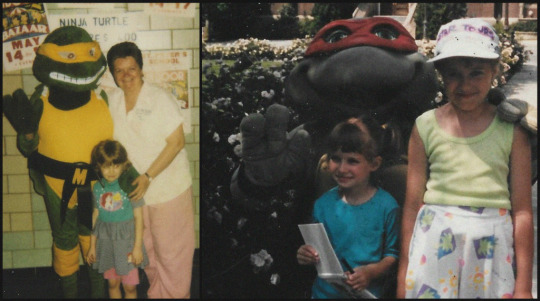
This take features a unique and kinetic animation style with an accessible story touching on what makes someone an outcast and how both adults and kids can navigate that. Mutant Mayhem features probably my new favorite depictions of April and of Splinter. Also, even though the non-turtle characters are almost all celebrity voice actors, the voice acting quality is very high.
---
Montana Moon (1930)
[letterboxd | imdb]
Sweet romantic story with comedic elements about a millionaire’s willful daughter (Joan Crawford) who, fleeing an awkward situation on a train ride with her family, runs into a cowboy (Johnny Mack Brown). The two quickly fall in love and are married, but the newlyweds face challenges when the differences in their lifestyles come into sharp relief. I love Crawford’s costuming and styling in this and her performance elevates the material. There are extended sequences with classic country-western music tho, so if that grates on you, you might want to take a pass on this one.
---
Leda – The Fantastic Adventure of Yohko (1985)
[letterboxd | imdb]
Yoko Asagiri is a young girl struggling to confess her feelings to the boy she likes. She decides to confess via a song she composed herself, but the song turns out to be a key to another world. Yoko teams up with a talking dog and a tiny warrior girl with a giant robot to fight the villainous Zell, who wants to use Yoko’s song to conquer her world. The animation and designs are top-notch as is the music. I personally enjoyed all of the Oz vibes suffused throughout the OVA.
---
Tomatos Another Day (1934)
[letterboxd | imdb | Eastman House]
Also known as “It Never Happened,” this is ostensibly a short film about a woman carrying on an affair and said affair being discovered by her husband. What Tomatos Another Day actually is is a send up of early talkies conceived and executed by independent filmmaker James Sibley Watson Jr. and collaborator Alec Wilder. If you’ve been around my blog for a while, you probably already know that I love Watson’s Fall of the House of Usher (1928) [Gifs/Stills]. However, I haven’t seen much else of his work! Thankfully, Eastman House has preserved and digitized a couple of his films and I plan on watching more soon. The link above has the short film with an introduction and outtakes!
---
Past Lives (2023)
[letterboxd | imdb]
Past Lives is a quiet but emotionally-rich love story by Celine Song that spans decades but also a single eventful week. I loved the way that the story was structured and how much the film relied on thoughtful pauses to communicate complicated emotions. The actors, Greta Lee, Teo Yoo, and John Magaro, all put in great work here. If you haven’t seen it yet, but plan to watch it, prepare to cry a bit.
---
The Mind Reader (1933)
[letterboxd | imdb]
Warren William plays a carny with a different gimmick for every town in the midwest. When the Depression affects his take, he and his cohorts, Frank (Alan Jenkins) and Sam (Clarence Muse), come up with a new scheme: fortune telling. As Chandra the Great, the crew start to rake it in, but when Chandra falls for an upright citizen (Constance Cummings), the scheme and their freedom is put in jeopardy.
I’m not accustomed to William playing this particular brand of sleazebag, but he really kills it as Chandra/Chandler/Munro. I appreciated how creative and adventurous the cinematography and editing is—not an especially common trait for pre-code films. I also made some still sets for the film!
---
Honorable Mention: Hard to Handle (1933) [letterboxd | imdb]
This film gets honorable mention because while I didn’t think it was particularly good, a few call outs are deserved. The bad: the plot was unnecessarily convoluted and the recurring sequences with fat people were iffy at best. The better: Ruth Donnelly shines as the comedically base mother of Mary Brian and she even gets to do a bit of physical comedy. Donnelly, Brian, and Cagney have a nice chemistry together throughout. In terms of costuming, the matching outfits of Brian and Donnelly are funny, but made funnier by the sheer quantity of mother-daughter ensembles they wear. The neutral: the film is packed with topical Depression-era references: notably Florida investment swindles and trends like dance marathons and the grapefruit diet. All-in-all, the filmmakers could have done less and achieved more.
---
The only big post I completed this month was a massive undertaking: Lost, but Not Forgotten: Omar Khayyam / A Lover’s Oath and a timeline for the film’s production and release.
Otherwise, I made themed gif and still sets from:
Torture Garden (1967)
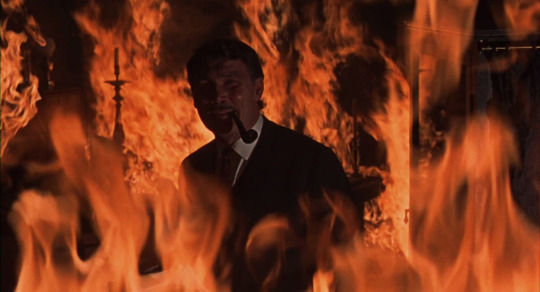
The Marriage Circle (1924)
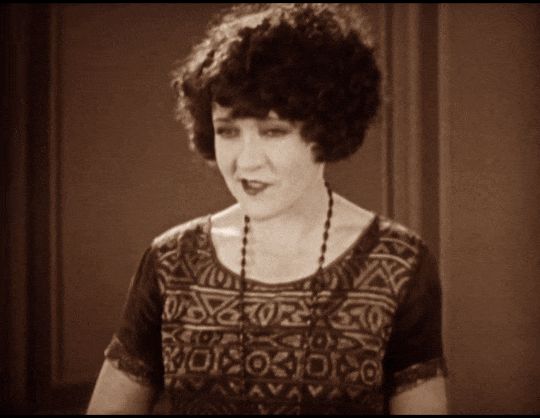
Le Altre (1969)

The Mind Reader (1933)
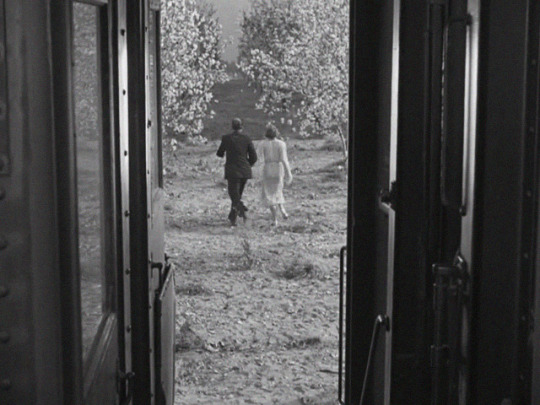
As for April, the cosplay I mentioned should be up very soon. If I have the time, both Lost, but Not Forgotten and How’d They Do That should have new installments posted and I have a few movies/shows on my themed gif/still agenda.
---
☕Appreciate my work? Buy me a coffee! ☕
#month in review#roundup#2020s#1920s#1930s#1940s#1980s#american film#independent film#finnish film#japanese film#japanese animation#animated movies#animation#anime#teuvo tulio#cecil b. demille#gina prince bythewood#classic film#classic movies#film#silent film#silent era#cinema#film recommendation#movie review
8 notes
·
View notes
Note
☆apologies if this has been answered already!! Out of curiosity, what time period does komorebi take place in? It seems somewhere in the past, evidenced by the lack of mentions of cars or cell phones, the general nostalgic feeling and the feeling of "this happened a long time ago",,, (that one post involving a mention of a coal cart is quite interesting as those peaked in use in the 1920s?? Though as far as i know they were still around till the 1970s, i might be wrong on this tho)
☆but at the same time it doesn't seem to take place too far off from the present, perhaps a few decades ago—there are lamps and a sink in Nightmare and Sunbeam's home so running water and electricity are a thing so anywhere before 1870 is out, and from the "sunbeam isnt allowed out in the rain" post, umbrellas and froggie raincoats exist (the latter of which is extremely cute and ALSO narrows it down to someplace after the 1950s— given other clues, my brain says maybe a very rural country village in the late 50s or early-to-mid-60s? Vaguely european perhaps,,,,,, Idk)
☆maybe I'm reading too much into things and there isn't really a set time period or location, which is cool too, and in which case i apologise!! I just really like history and it's 3 minutes to 1 am ahaha
☆also this au is so very adorable rahhh its so homey and comfy and, dare i say it, almost cottagecore? It fills me with such joy :]
Hello!!! I'm glad the AU is on your mind so much that you're delving into the time period, I think this is a fun question and I love it. I like your dating of the specific items in the AU!
There is not a set location/time period, since we are dealing with a magic kingdom of monsters and humans, and we do exist in the wibbly wobbly time period of "medieval fantasy"-which can be hardly called medieval at all sometimes. Medieval in the loosest definition. Which means I get to throw history into a blender and yell "magic". You are right when saying the area should be based on a rural country village in Europe!
I should also note to you that the artwork typically depicts a time period further in the story than the fanfic itself. Not all of the works operate in the same time frame and there are significant advancements in technology/plumbing/etc. that occur during Nightmare's time in the AU-that may or may not be his influence. I like to jump around in the timeline just because a) I'm lazy and b) I don't feel like having to think of the logistics of the village's non-existent sewer network. There's also to note that not all of the marks in the story are dated precisely to our own, because monsters and magic and also I can't be fucked to create a linear timeline that follows real world historical advancements. Terribly sorry for the inconvenience.
The comic about Sunbeam not being allowed out in the rain takes place in the castle/"post-story" timeline, therefore dating it in the gray "modern" era where you can safely presume most items we have today are provided to the Henchmen. Surface technology has been provided to the child, and he is thoroughly bewildered. Nightmare was similarly confused when he first left his AU.
ADDITION: The AU is still under development and is not fully fleshed out in terms of worldbuilding, so you can totally ask me about this much later and I'll probably give an added response.
#inbox#moonstones-and-mangoes#worldbuilding#modmare answers#me when I remember I have to do the entire worldbuilding
30 notes
·
View notes
Note
different anon here but does your gf have any good lesbian media/book recs (since she read so many lesbian books in such a short amount of time lol)!!
gf said, and i quote,
“i’m going to take the rest of the day off to work on this list”
so without further ado, here is her short list of recs copied straight from her (and with my own comments in italics for the ones i know):
Okay! So here’s my book recommendations.
- Fingersmith by Sarah Waters. Loved this book, love all Sarah’s books (haven’t read the non-gay one though, sorry not sorry). Sarah is a great one for the twists and I enjoyed this one so much that I actually recommended the book to my mam and she also loved it. The story is gay + set in the 19th century + lady/handmaiden trope so what’s not to like. Also really recommend. For related media, there’s a BBC miniseries based off of it, and a film by Park Chan-wook called The Handmaiden, which is honest to god one of the best films ever made. It is harrowing, but it is brilliant.
- Tipping the Velvet by Sarah Waters. Again, gay + set in the 19th century. Explores the queer scene in Victorian London to its full extent. A real page turner. GREAT fun, a little dark at points, but good and raunchy.
- The Paying Guests by Sarah Waters. Gay + 1920s + yearning + tense + murder + dramatic. My recommendation when it comes to Sarah’s books is to give them time. Do not put them down because I promise you they will get GOOD. Slowburn of slowburns. Gorgeous.
- Affinity by Sarah Waters. Gay + Victorian prison + disgraced spiritualist. Compared to the other three this one is actually a little bit… boring? You’re kinda waiting for something to happen for a long time but WHEN IT DOES boy is it worth it. And that part that’s worth waiting for actually made me want to read it again.
- The Night Watch by Sarah Waters. This was a bit like Affinity for me in that I was waiting for it to pick up a bit but once again, Sarah did not disappoint and I finished it wanting to read it again. The story is told backwards through third-person narrative, takes place in 1940s London during and after WWII and follows ‘Kay, Helen and Julia, three lesbians; Viv, a straight woman; and Duncan, her brother, whose sexuality is ambiguous.’
- One Last Stop by Casey McQuiston. This was my favourite book of 2021 because I read it as a baby gay and it’s set in modern times and is so full of life and found family and fun but also considers life for gay people in the 1970s and things that they didn’t often get to experience (loudly, at least). It tugged at my heart this one. For the “sort by top kudos” “filter for fluff” fanfic reader. Not really my style.
- This is How You Lose the Time War by Amal El-Mohtar and Max Gladstone. This is the most beautiful book I’ve ever read. As Madeline Miller said, ‘this book has it all: treachery and love, lyricism and gritty action, existential crisis and space-opera scope, not to mention time travelling superagents.’ This story is truly gorgeous. Unbelievable. Not even words to describe how good this one in. Possibly my favourite read of all time.
- Afterlove by Tanya Byrne. This book made me cry! In…a good way? I’m not sure. But I enjoyed it. Set in modern day when MC dies and joins ‘a clan of fierce girl reapers who take the souls of the city’s dead to await their fate’ but can’t forget her first love who she’ll do anything to see again. This one just tugged at my heart a lot.
- Priory of the Orange Tree by Samantha Shannon. Epic fantasy. Dragons. Follows many characters in GoT style so it requires A LOT of focus. This isn’t a light read but it’s very good (and a prequel is coming out in 2023). IF YOU LIKE FANTASY AT ALL READ THIS ONE IMMEDIATELY.
- Annie on my Mind by Nancy Garden. Okay this one will definitely not be the most well-written book you’ve ever read buuuuut there’s something VERY precious about it. It follows the relationship between two 17-year-old girls, Annie and Liza, in New York. As far as I know, when this book was published in 1982, it became the first YA novel ever to depict a main character’s same-sex relationship in a positive light. (In the 90s copies of this book were burned on the steps of a school in Kansas and there was a whole court case about it).
- Gideon the Ninth, Harrow the Ninth and Nona the Ninth by Tamsyn Muir. Oh these are great. I was about 100 pages in to the first two before I could grasp what was going on but the story is intriguing, the characters are great, there’s good humour, and the world is fascinating. The first one, Gideon, is almost like Hunger Games meets Cluedo. I’d highly recommend these and I can’t wait until my gf reads them so I can talk to her about them.
- Everything Leads to You by Nina LaCour. This one is a nice, light read. MC is interning as a set designer so I found this aspect of it really interesting actually. Has some mystery, some gay love, so like why not read it.
- Matrix by Lauren Groff. ‘Born from a long line of female warriors and crusaders, and cast out from the royal court, Marie is sent to become the prioress of an abbey.’ This is a bit of a dreary, grey read (probably due to the setting and period, think Wuthering Heights), but there was something about it that fascinated me and kept drawing me back in.
- The Falling in Love Montage by Ciara Smyth. Lesbian rom-com set in modern Ireland. Very light, easy read (with some serious topics too).
- Not my Problem by Ciara Smyth. Again, a very light and easy read for the most part, with a touch on some heavier issues. Quite funny too!
- Last Night at the Telegraph Club by Malinda Lo. Set in 1950s America and tells the story of Lily Hu, a teenage daughter of Chinese immigrants as she begins to explore her sexuality. This time period was really interesting and the incorporation of Chinese culture into the story was something I hadn’t read before.
131 notes
·
View notes
Text
Jenny's ongoing list of films watched 2024
February
January list, here.
Inland Empire (2006)***
It took three attempts to get through this long, confusing film. Like Mulholland Drive or the Season Three of Twin Peaks, Lynch films improve on repeat viewings even if meaning remains elusive. That is part of the joy-- sometimes you just vibe with it.
Death of Stalin (2017)****
One of my favorite films of the last two decades. A harried farce with the bloody-mindedness of Macbeth. Like the Scottish Play, we know how its going to come out, but the fun is in watching the articulate villain, played with delicious malice by Simon Russell Beale being outdone by a team of bumbling, petty bureaucrats and one very bad ass soldier.
The Boyfriend (1970)***
Ken Russell's surreal tribute to the burlesque musical genre makes the most of its setting in the 1920s by putting his star Twiggy in iconic psychadelic reiterations of the flapper dress. If you opine the fact that drop waist dresses come back into style every 15 years or so, then this movie is as much to blame as anything.
Poor Things (2023)***
Emma Stone gives a wild and convincing physical performance as Bella, a baby's brain in the body of her dead mother and Mark Ruffalo as typical 19th Century Rake Getting His Comeupance iscasting I didn't know I needed. I loved the yearning Godwin (Willem Defoe in truly amazing Frankenstein's monster makeup) and though I haven't read the book, I was drawn into the grotesque, ai generated world of the film. The aesthetics of this movie are as engrossing as the story and characters.
Adventures of a Dentist (1965)**
The Soviet version of the live action Disney comedies of the 70s, where a humble person is given magical power. Here a dentist is given extraordinary, almost magical abilities to perform dentistry without pain. He becomes a celebrity and his fall from grace involves him giving in to the decadent trappings of being a popular dentist. The humor has a darker edge than Disney though I wouldn't go so far as to call it a black comedy.
Adolf Hitler: My Part in His Downfall (1973)**
This Spike Milligan film plays like a double episode of Dad's Army, not least because of the presence of Arthur Lowe who plays practically the same character here as he does on the tv show. That is not the end of the world however and this is easy to like farce with Milligan's ascerbic, anti-authoritarian bent that is grittier than anything on the sitcom.
The Master (2012)**
I had high hopes for this, one of Phillip Seymour Hoffman's final films and his last collaboration with director Paul Thomas Anderson is loosely based on the origin story of Scientology. Joaquin Phoenix plays a shell shocked veteran who drifts into the path of the cult leader played by Hoffman. Amy Adams gives a chilling performance as his much younger, controlling wife who is the real power behind the cult. I think I would have an easier time with this film if Anderson hadn't gone around giving interviews saying that Scientology and it's founder L. Ron Hubbard had "helped a lot of people." Of course, this is PTA and Phoenix's character isn't helped at all and he makes the cult worse by being a violent enforcer for the leader's enemies. The levels of whitewashing involved in making a deeply misogynistic cult into a secret matriarchy is just...ugh. However, the homoerotic tension between Hoffman and Phoenix makes the film worth looking out.
Murder of Quality (1991)**
Made for TV adaptation of John Le Carre's second novel. Denholm Elliott plays Smiley as more doddering and anti-social than Alec Guinness' iconic version of the character. This early Smiley story is more a traditional English village murder mystery, ala Miss Marple, with Glenda Jackson playing Ailsa, Smiley's war buddy that runs a women's magazine. Christian Bale plays one of the students at an elite prep school that forms the economic backbone of the town. Le Carre is merciless in his portrayal of the toxic, petty characters, the wealthy and wannabe wealthy swamp dwellers who run rings around the local constabulary until Smilley steps in and withstands their slings and arrows long enough to solve the case.
The Private Life of Sherlock Holmes (1970)***
Sometimes you sit down to watch a movie with such low expectations that you are pleasantly surprised that it doesn't totally suck. The excitement of things not being as bad as you feared can blot out some of a movie's excesses. At the end of the day this is Billy Wilder, physically incapable of creating a boring movie throwing the whole bag of tricks at this faux biography of Holmes starring Robert Stephens and Colin Blakely. There's farce and physical comedy, verbal gymnastics and exotic locations. Holmes' possible homosexuality is tastefully hinted at and attempts to create a sensationalist account of his drug use, amount to little before the mystery gets rolling. One of the big delights is Christopher Lee as Mycroft whose scenes with Robert Stephens are bitchy queen pissing contests. Genevieve Page does a turn as a would be damsel in distress who turns out to be a worthy opponent to Holmes similar to Irene Adler.
Irma La Duce (1963)***
For some reason between this and Poor Things I ended up watching two movies about Parisian brothels this month. Billy Wilder based this pastiche of 1950s travelogue adventure films like To Catch a Thief and Charade on a French stage play. A strange attempt to weld the success of the Apartment with Some Like it Hot, reconfiguring a Marilyn Monroe vehicle as a reunion of Jack Lemmon and Shirley MacLaine. Like the Apartment, Irma LaDuce is tinged with melancholy while avoiding a lot of the cliches about sex work that wind up dating so many films on this topic. The main complaint I have about Irma LaDuce s that it's about 45 minutes too long, a common complaint about many films of this period. (Damn Lawrence of Arabia and all who sail in her).
Witness for the Prosecution (1982)***
A made for tv adaptation of the classic courtroom drama, which credits Billy Wilder's screenplay of his film version. Ralph Richardson and Deborah Kerr star in this remake and honestly their chemistry is just off the charts and we're left to wonder how they never managed to make a film together before. Wendy Hiller, Diana Rigg and Beau Bridges round out the amazing cast. Lacks the tension and edge of Wilder's film but I'm having too much fun with Ralph to care.
The Major and the Minor (1942)**:
Billy Wilder's first film as writer and director has some of the hallmarks of his later, greater works: farce, trains, mistaken identity, and queer themes in the form of a lesbian coded sister of Ginger Roger's romantic rival. That all the fuss is about fairly bland Ray Milland is easy enough to overlook as Wilder makes the film about toying with Rogers image as sophisticated, sexy, dancer. Typical Wilder inside jokes about the film industry abound, such as a craze for Veronica Lake hairdos among the tween set and swipes at Hollywood actors like Charles Boyer Rogers' childish masquerade to avoid paying full adult fare is preceded by a series of calamities where she's pursued and objectified by a lot of nasty older men. Hoping to escape their advances as well as the ignominity of turnstyle jumping, she maintains the charade through a long weekend with a lot of handsy tween boys until Milland's fiancee is discredited as a controlling social climber. There is a bizarre side track into her home town where Rogers also impersonates her mother before revealing her grown adult self to Milland. No one ever accused Billy Wilder of being restrained I guess.
The Children's Hour (1961)****
This classic of queer cinema was necessarily a scorched earth tragedy at the time of its release. William Wyler's dreamy, restless camera drags you into the warm, cozy life of this female partnership between Shirley Maclaine and Audrey Hepburn that seemingly has the potential to be a romantic partnership. When nasty gossips and spoiled children start a rumor that they are a couple, the scandal destroys their business and standing in the community. Terrorized by the homophobic townspeople, they are eventually "cleared" of the crime of being gay for each other, just when Maclaine's character comes to the brutal realization that she really is in love with Audrey Hepburn's character. It's hard to watch her grief and shame as she admits that the bullies have discovered a truth about her that she didn't know herself. A fact so many queer people can find relatable. The film is based on a play by Lilian Hellman which used the topic of homosexuality to expose the cruelty of female narcissists who bully their way into power. There is much in common with Hellman's The Little Foxes in that way, but the film, perhaps owing to Wyler's inherent romanticism has more of a Romeo and Juliet quality than the play. One feels that Audrey Hepburn has perhaps realized the truth in the lie, just a few moments too late.
Sweet Charity (1969)***
Directed by Bob Fosse, starring Shirley MacLaine and Sammy Davis Jr and Chita Rivera this classic musical combines the best of Fossee's signature choreography, sixties pop show tunes and the psychadelic aesthetics of the late 60s. This and the Boyfriend have a lot in common, though I think the music in Sweet Charity is more solid and the contemporary setting makes it a tad edgier. MacLaine plays yet another flavor of sex worker, a dancehall hostess and paid companion who seeks to be elevated out of her life into respectability through marriage. The fiancee here is uptight and lacking in appeal and when he finally just flakes out in the final reel it's no great loss to the film.
Thief (1981)**
Atypical heist film starring James Caan and Jim Belushi, directed by Miama Vice creator Michael Mann. You can see the beginnings of that iconic 80s TV show, in this movie which favors long scenes of action being edited to music with sparse dialog. Caan squares off against Tom Signorelli a local mob boss who dares to threaten Caan's wife played by Tuesday Weld.
7 notes
·
View notes
Text
Me, makes a post about how weird it is that there's "Hitler Ice Cream" in India and just the general weirdness of countries with very few Jews (now or ever) being super antisemitic.
some total weirdo goblin in the comments:
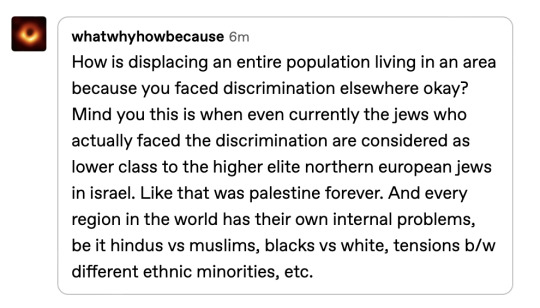

first off if you come in dismissing antisemitism Jews anywhere (or any when) in the world face by some weirdo statement about Israel, guess what you're making Zionists good job.
now to the insanity "higher elite Northern European Jews in Israel"... does this person think that there's a cabal of Swedish Jews that run Israel? what?
any ways this next is a common misconception, the US did not establish Israel. The US was largely not involved, and indeed until the 1970s had at best a lukewarm relationship with America.
The Zionist movement, a modern secular interpretation of Jewish religious longing for the land of Israel (its worth saying every generation or so there would be a mass movement of Jews to Eretz Yisrael in hope of the Messiah) started in the 1880s, these were largely Jews from Eastern Europe, the Russian empire, at the same time an unrelated wave of Yemenite Jews came to the land about 10% of Yemen's Jews came to Palestine between the 1880s and 1914.
Any ways by WWI many thousands of Jews had settled in the Ottoman Mutasarrifate of Jerusalem. When the war broke out many were jailed as enemy aliens for having originated in Russia (though they were fleeing Russia and had no love at all for the Tsar) Both the Germans and the British hoped to court the Zionists as allies, but the Germans were tied by their alliance with the Ottomans. In 1917 the British foreign minster issued a letter, The Balfour Declaration, which declared:
"His Majesty's Government view with favour the establishment in Palestine of a national home for the Jewish people, and will use their best endeavours to facilitate the achievement of this object, it being clearly understood that nothing shall be done which may prejudice the civil and religious rights of existing non-Jewish communities in Palestine, or the rights and political status enjoyed by Jews in any other country."
When the First World War ended the Ottoman Empire was carved up between the British and French. Technically these new colonies were supposed to be "Mandates" from the new League of Nations and the new colonial masters were meant to be readying them for independence, but they were colonies by another name. The British enshrined the Balfour Declaration in the founding of The Mandate of Palestine at its founding in 1923.
Starting even before the Mandate, with the first Zionist Congress in 1897, but accelerating greatly after 1920, the Yishuv organized itself, forming a shadow government, and military, the Haganah.
In the aftermath of the 1930s Arab uprising, the 1939 British closing of Jewish immigration to Palestine, and the Holocaust the Yishuv became in open warfare with the British colonial administration, particularly since there were hundreds of thousands of holocaust survivors in "displaced persons camps" in many cases the same concentration camps the Germans had kept them in months earlier. The Zionists wanted these people to be allowed to come to Palestine, the British still said no.
Under international pressure, and effectively broke after the War in 1947 the British turned to the new UN and effective said they were leaving in 1948 and the UN could figure it out before then or not they did not care. So in November 1947 the UN voted for Resolution 181. Which would have split the land of mandate Palestine between Arabs and Jews with an area around Jerusalem as an international zone. Ten years earlier the British had also floated splitting the land with an international Jerusalem.
Any ways the 700,000 Jews of Palestine said "yes" under David Ben-Gurion, and on May 14th 1948 declared independence as "The State of Israel" the day the British Mandate ended and the last British Solider left. There was some debate around the name, and they almost picked "Palestine" as the official name of the state in Arabic, but last minute decided against it. The Arabs were much less united and organized however the Arab Higher Committee and the Arab League rejected 181 and nearly at once started the Palestine Civil War (November 1947-May 1948) The Yishuv's military the Haganah fought and won this civil war against the Arabs without outside help and indeed while being in conflict with the British who deeply resented them and were looking to better their relations with the Arabs. Indeed British officers lead the Jordanian military.
After Israel declared statehood it was invaded by all the Arab states around it, Egypt, Jordan, Syria, Lebanon with a large force of Iraqis joining through Syria and Jordan and symbolic forces from countries like Saudi Arabia and Pakistan.
The US under Harry Truman was the first to recognize Israel, but other than that the US did very little for Israel during the war and indeed Truman's State Department kept trying to get him to take back recognition. The UN never tried to take control of Jerusalem in line with the 181 plan and as I mentioned British officers played a key role in Jordan's taking of the West Bank and East Jerusalem during the war.
All a long explanation to say Israel founded itself, it was not imposed by an outside army. The Arab states at the time, and in later years thought that a war with the Zionists would be easy, a matter of just marching was a phrase used. When in fact it was not easy they often would fall back on the idea that really they had not lost a war to the Zionist Jews but to America, the UN, the UK, who ever, losing to a Superpower is not humiliating after all. Likewise Leftist theory about colonial Israel and how a national liberation might happen needs Israel to be a colony, a colony has a mother country that both supports it but more important is a place where its population might go if the settler colonial state is wrapped up. So Israel is reduced to a "military outpost of the United States!" which takes an old Arab idea that there "is no Israeli state only an Israeli Army" Of course this is untrue, Israel is not a colony of the US or any one else, its citizens have no other home and would not willingly give up theirs.
feel however you want about all this, but know the history before making statements.
12 notes
·
View notes
Text
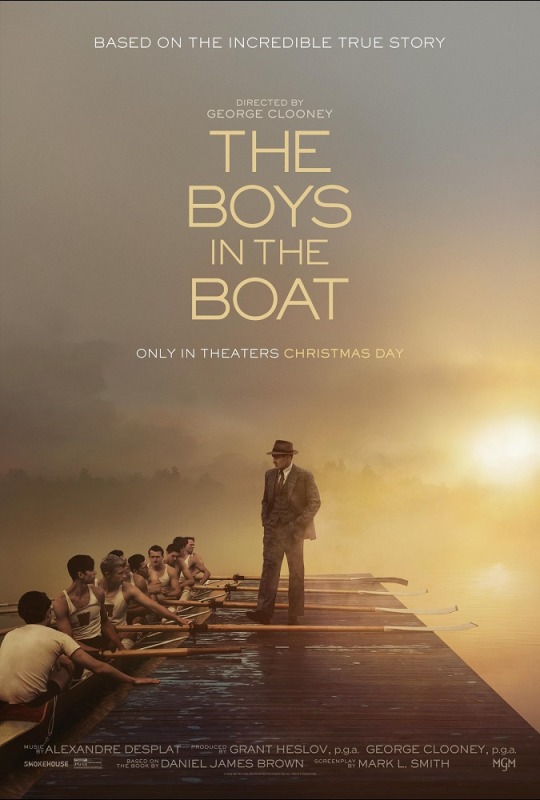
THE BOYS IN THE BOAT (2023)
Starring Callum Turner, Joel Edgerton, Jack Mulhern, Sam Strike, Alec Newman, Peter Guinness, Luke Slattery, Thomas Elms, Tom Varey, Bruce Herbelin-Earle, Wil Coban, Hadley Robinson, Courtney Henggeler, James Wolk, Chris Diamantopoulos, Glenn Wrage, Edward Baker-Duly, Adrian Lukis, Dominic Tighe, Alec Newman and Andrew Bridgmont.
Screenplay by Mark L. Smith.
Directed by George Clooney.
Distributed by Amazon MGM Studios. 124 minutes. Rated PG-13.
As a director, George Clooney certainly likes living in the past. Of the nine films that he has helmed, seven of those were period pieces, many of them based on true stories. Confessions of a Dangerous Mind took a look at TV personality Chuck Barris in the 1960s and 1970s. Good Night and Good Luck took place during the McCarthy era of the 1950s. Leatherheads looked at the early days of football in the 1920s. The Monuments Men took place during World War II. Suburbicon was during the 1950s. The Tender Bar was about growing up in the 1970s and 1980s. In fact his two films which did not take place way in the rear-view mirror were The Ides of March (a current-day political thriller) and The Midnight Sky (a post-apocalyptic tale.)
The Boys in the Boat returns the filmmaker to the World War II era – specifically revolving around the leadup to the 1936 Berlin Olympic Games. It also is intriguing by looking at the United States in the latter years of the Great Depression. So, in theory, it should be an interesting time capsule.
Perhaps the biggest problem with The Boys in the Boat is simply this – the 1936 US crew team, which did win a Gold Medal and helped to embarrass Adolf Hitler at his own Olympics, isn’t even the most interesting or best-known American athlete during that Olympics. That would be Jesse Owens, who as a character has a few short appearances here, and who has been subject of several biopics of his own which explore this particular crossroads in history.
More to the point, to be perfectly honest, crew may be a fascinating, hard sport to compete in, but it is a pretty dull one to watch. After all, it’s like the old standup comedian said, I don’t want any part of a sport that they used to force slaves to do. And this view of rowing is coming from someone who grew up in a city in which crew is a tradition. In fact, of the four college squads which are shown to have had a chance to go to the Olympics back then, one of them was from my hometown.
In fact, George Clooney acknowledged that part of his motivation in making the film was that he felt there were no films that faithfully and excitingly captured crew as a sport and a pursuit.
Does he remedy that problem? Probably not. But The Boys in the Boat has its moments.
Probably Clooney and his long-time collaborator Grant Heslov and screenwriter Mark L. Smith tossed their net a bit too wide. There were nine members of the crew team being watched in The Boys in the Boat. Then you have to add the coaching staff, friends, families, wives, girlfriends, fellow students, neighbors in their town, opposing teams, opposing coaches, the Olympic committee and more. There are probably like 100 speaking roles, and that’s before they even go to Germany for the Olympics and the cast of characters is multiplied.
That’s a whole lot of characters to fit into a two-hour movie, to the point that many of the characters here are basically given one-dimensional oversimplifications of their roles: The uptight rower, the supportive girlfriend, the unfeeling father, the sexy and sweet coach’s wife. (That character, while often enjoyable, also feels like an anachronism in this film. While I could probably see her acting like this in… say… the 1960s, her open sexuality and confident feminism feels out of place in the 1930s.)
These characters undoubtedly had a lot more room to breathe in Daniel James Brown’s novel of the same title, but too many people here come off as shallow. Of course, the film basically spends much of its time exploring two characters – although they even disappear from the film for chunks of time. These characters are the extremely poor oarsman Joe Rantz (Callum Turner), who has taken on the role on the team as a way of financial survival, and the gruff-but-good-hearted crew coach Al Ulbrickson (Joel Edgerton), who is doing all in his power to get these talented-but-unmotivated boys into the Olympics.
From the look and the pace and the subject of The Boys in the Boat (and the fact that it is being released on Christmas day), it seems likely that Clooney, et al, were hoping for some award recognition for their film. And perhaps they will, at least in the technical nominations. The film looks spectacular and realistic, from the desperate Washington state streets of the Depression to the tony halls of early academia to the self-consciously grandiose splendor of the Berlin Olympics.
The Boys in the Boat is not as good or important of a film as the filmmakers had hoped it would be, but it’s worth taking a look at.
Jay S. Jacobs
Copyright ©2023 PopEntertainment.com. All rights reserved. Posted: December 25, 2023.
youtube
8 notes
·
View notes
Note
i've seen couple of fics in your lists that took time in 20th centuries or like the past in general. do you mind if you put them in one list tho?
yes i tend to read a lot of them hehe
prepare yourself, it's gonna be a very long list
Medieval? 20th century fics? 1920s 1930s 1940s 1950s 1960s 1970s etc au
Adore You by isthatyoularry
M, 66k
“We invited our new acquaintances from uptown. You’ve simply got to meet their oldest son!” said his mother with a flourish, and suddenly it became abundantly clear as to why his parents had so adamantly demanded he join them in Deansville for the entirety of the summer.
Against his wishes, Harry spends the holidays at his family’s summer estate, and is reluctantly pulled into a courtship he didn’t ask for. Harry doesn’t want to get married, but Louis does. They don’t fit, but then again they really, really do.
Vaguely set in the 1920’s. Headpieces, jazz, fashionable canes, and flapper dresses, and that.
Chasing Empty Spaces by Lis (domesticharry)
E, 79k
The year is 1934 and Harry Styles was to inherent the largest tobacco firm in the south. His parents have picked out the “perfect” girl for him to marry and he has the privilege of receiving the highest education possible. The problem was, Harry hadn’t realized he didn’t actually want any part of that future until he met a mechanic named, Louis Tomlinson.
Through Eerie Chaos by MediaWhore
G, 102k
For as long as anyone can remember, Old Hillsbridge Manor has always been believed to be haunted. Everyone in the village agrees and keeps a respectful, fearful, distance. New in town after a bad breakup and an internship that led to disappointment rather than a permanent job, Harry Styles figures taking pictures of the decrepit building could be a great new creative project. Or at least a much-needed distraction while he searches for a job and crashes at his parents’ new house. No one warned him about the apparitions though; about the music, the laughter, the people who flicker and vanish when you call after them, the echoes of a past that should be long gone… Harry has never believed in spirits but even he can admit that there’s something weird going on. What starts as mere curiosity evolves into a full-blown investigation and soon enough, Harry finds himself making friends with an aristocrat from the 1920s and struggling with finding the best way to tell him that he’s dead.
The Ghost Hunter AU where Niall lives to prove ghosts are real, Zayn is a skeptical librarian and Harry gets caught up in a century-old mystery and catches feeling in the process.
Landslide by aimmyarrowshigh, spibsy
E, 143k
The year is 1976. In November, Jimmy Carter will take control of the White House. Americans are meeting Laverne & Shirley at their apartment in Milwaukee. Hotel California diverges from the reign of Kool & the Gang. And the FBI is still reeling from the repercussions of Watergate, the tragedy at Wounded Knee, Operation Family Secrets, and the strategic terrors of the anti-cult movement.
That's what Special Agent Harry Styles has been told is the basis of his mission to an abandoned farmhouse in rural New Hampshire.
With his hair grown out long and his shirt untucked, he's going undercover to do reconnaissance on suspected cult leader Louis Tomlinson, who has led a group of people out into the middle of nowhere, leaving no record of the life he'd had before. All Harry knows is what the agency gave him: Tomlinson's name, and instructions to figure out what he's doing with the eleven people he brought with him.
In the year that Harry spends undercover and under Louis Tomlinson's wing, he learns more than he ever expected.
Here In The Afterglow by fondleeds
NR, 88k
“If you hadn’t noticed, I don’t have many friends,” Louis whispers, the blossom of insecurity in his stomach unfurling and clawing its way into his throat.
Harry is silent for a long time, and then he speaks; a soft, slow uncurl that makes Louis’ stomach shake. “I’ll be your friend.”
-
1970’s AU. In a tiny town in Idaho, Louis’ life is changed forever by the arrival of a curious stranger.
Victorian Boy by audreyyheart
E, 101k
Victorian AU. Harry the virgin Duke of Somerset knows little of love, while Louis the sly Duke of Warwick knows too much. When the two dukes come together for the Bilsdale fox hunt in York, Harry finds himself drawn into Louis' bed. But when secrets from Louis' dark past come to light, Harry fears that the fox isn't the only one being hunted.
Ever Since I Tried Your Way by flowercrownfemme
E, 25k
Harry had been kissed before, but never like this.
He’d shared sweet, curious kisses behind bleachers and in soda shop booths, one or two more daring ones in cars parked on dark suburban streets, but the girls he’d kissed had never filled him with the desperation that erupted from Louis’ touch. He parted his lips and pulled him closer, as though he could breathe Louis straight into his lungs, as if he could swallow him. He wanted to consume Louis the way he consumed the body and blood of Christ. He wanted to place Louis on his tongue and feel him dissolve into a frothy mess of starch and saliva. He wanted to gulp him down until his teeth were stained purple and he was drunk on him. He wanted him in some violent holy way that made his hands shake where they were twisted in Louis’ shirt.
In 1949 Harry left his bride at the altar, running away from the only life he'd known. When a kindhearted farmer offers him a ride in his truck and a place to sleep the two find themselves inexplicably drawn together. Isolated on Louis' farm with nobody but a field of dairy cows to intrude, the men are finally able to explore the parts of themselves they've spent their lives hiding away.
the last person on earth i could ever marry by igotfeels
E, 50k
A Pride and Prejudice AU, where Harry is fed up with rich men and Mr Tomlinson is a very rich man.
Love you in the dark by perzikje
E, 10k
The story of a historical wedding night: in which Louis is quite unaware as to just how clueless his brand new husband is about sex. They try their best to figure it out together.
An Invincible Summer by Brooklyn_Babyloon
E, 44k
Never content to stay in one place for long, a few months down south researching for his novel seemed like an idyllic, slow-paced summer to Louis. He wasn't ready for the blistering heat, the backbreaking work of watermelon picking, or how stifling the attitudes in rural Georgia would feel. And he definitely hadn’t anticipated falling in love with the farmer’s son.
The summer of 1946 would turn out to be everything worth writing about.
a perpetual sunrise by moonshinelouis (lunarflwrs)
M, 31k
Louis Tomlinson lives the archetype of a successful man: he has a big white house, a gorgeous wife, and adorable daughters. Happiness is a superfluity, really. And his daughters' dimpled piano teacher is nothing more than a sinful distraction.
1950s AU.
Atlas At Last by louisandthealien
M, 83k
He doesn’t know what he had been expecting out of the road trip itself besides burping contests and too much shitty gas station food with Oli and Stan, but in the brief moment before Harry ambles up his driveway, Louis idly wonders if this is about to become some sort of Gay Coming of Age story.
Maine to California in ten days. In which Zayn’s an open-shirt hippie they meet somewhere in Ohio, Liam’s the pastor’s son running away from home, and Niall’s the number they call on the bathroom wall.
It’s 1978. Harry and Louis are just trying to get to San Fran in time for the Queen concert.
Box of Rain by indierection (amandamoraisa)
M, 26k
Louis is definitely not the next Muhammad Ali, just an illegal boxer with no prospects for the future. Harry is a hippie Uni student that in his free time informally works as a ring boy. Somehow he manages to always get tangled on the ropes and at the same time charm the pants off of all the fighters and patrons. They meet in Manchester in 1977 and, even though they don't seem to have much in common, they... Well, they just sort of click, really.
-
The one with a friendship ruiner game of Monopoly, Harry always ending up in jail for wanting to save the world, Louis face to face with his archenemy and way too many references to 70s music.
Also staring Zayn as a brooding anarchist punk rocker, Liam as the nerdiest and nicest boxer in all Britain and Niall as a bookmarker that can easily convince people to bet fortunes, but can't make his friends realise their mutual crush on each other.
please leave a like and reblog
#louis tomlinson#larry stylinson#fic recs#harry styles#larents#fic rec#larry fic recs#medieval au#20th century au
29 notes
·
View notes
Text
Revenge of the Linkdumps

Next Saturday (May 20), I’ll be at the GAITHERSBURG Book Festival with my novel Red Team Blues; then on May 22, I’m keynoting Public Knowledge’s Emerging Tech conference in DC.
On May 23, I’ll be in TORONTO for a book launch that’s part of WEPFest, a benefit for the West End Phoenix, onstage with Dave Bidini (The Rheostatics), Ron Diebert (Citizen Lab) and the whistleblower Dr Nancy Olivieri.

If you’ve followed my work for a long time, you’ve watched me transition from a “linkblogger” who posts 5–15 short hits every day to an “essay-blogger” who posts 5–7 long articles/week. I’m loving the new mode of working, but returning to linkblogging is also intensely, unexpectedly gratifying:
https://pluralistic.net/2023/05/02/wunderkammer/#jubillee
If you’d like an essay-formatted version of this post to read or share, here’s a link to it on pluralistic.net, my surveillance-free, ad-free, tracker-free blog:
https://pluralistic.net/2023/05/13/four-bar-linkage/#linkspittle

[Image ID XKCD #2775: Siphon. Man: ‘Wow, it’s true — the water doesn’t flow up the tube anymore.’ Woman: ‘Honestly, it’s weird that it ever did. Why did we ever think it was normal?’ Caption: ‘Physics news: the 2023 update to the universe finally fixed the ‘siphon’ bug.’]
My last foray into linkblogging was so great — and my backlog of links is already so large — that I’m doing another one.
Link the first: “Siphon,” XKCD’s delightful, whimsical “physics-how-the-fuck-does-it-work” one-shot (visit the link, the tooltip is great):
https://xkcd.com/2775/

[Image ID: A Dutch safety poster by Herman Heyenbrock, warning about the hazards of careless table-saw use, featuring a hand with two amputated fingers.]
Next is “Hoogspanning,” 50 Watts’s collection of vintage Dutch workplace safety posters, which exhibit that admirable Dutch frankness to a degree that one could mistake for parody, but they’re 100% real, and amazing:
https://50watts.com/Hoogspanning-More-Dutch-Safety-Posters
They’re ganked from Geheugenvannederland (“Memory of the Netherlands”):
https://geheugenvannederland.nl/
While some come from the 1970s, others date back to the 1920s and are likely public domain. I’ve salted several away in my stock art folder for use in future collages.
All right, now that the fun stuff is out of the way, let’s get down to some crunch tech-policy. To ease us in, I’ve got a game for you to play: “Moderator Mayhem,” the latest edu-game from Techdirt:
https://www.techdirt.com/2023/05/11/moderator-mayhem-a-mobile-game-to-see-how-well-you-can-handle-content-moderation/
Moderator Mayhem started life as a card-game that Mike Masnick used to teach policy wonks about the real-world issues with content moderation. You play a mod who has to evaluate content moderation flags from users while a timer ticks down. As you race to evaluate users’ posts for policy compliance, you’re continuously interrupted. Sometimes, it’s “helpful” suggestions from the company’s AI that wants you to look at the posts it flagged. Sometimes, it’s your boss who wants you to do a trendy “visioning” exercise or warning you about a “sensitivity.” Often, it’s angry ref-working from users who want you to re-consider your calls.
The card-game version is legendary but required a lot of organization to play, and the web version (which is better in a mobile browser, thanks to a swipe-left/right mechanic) is something you can pick up in seconds. This isn’t merely highly recommended; I think that one could legitimately refuse to discuss content moderation policies and critiques with anyone who hasn’t played it;
https://moderatormayhem.engine.is/
Or maybe that’s too harsh. After all, tech policy is a game that everyone can play — and more importantly, it’s a game everyone should play. The contours of tech regulation and implementation touch rub up against nearly every aspect of our lives, and part of the reason it’s such a mess is that the field has been gatekept to shit, turned into a three-way fight between technologists, policy wonks and economists.
Without other voices in the debate, we’re doomed to end up with solutions that satisfy the rarified needs and views of those three groups, a situation that is likely to dissatisfy everyone else.
However. However. The problem is that our technology is nowhere near advanced enough to be indistinguishable from magic (RIP, Sir Arthur). There’s plenty of things everyone wishes tech could do, but it can’t, and wanting it badly isnlt enough. Merely shouting “nerd harder!” at technologists won’t actually get you what you want. And while I’m rattling off cliches: a little knowledge is a dangerous thing.
Which brings me to Ashton Kutcher. Yes, that Ashton Kutcher. No, really. Kutcher has taken up the admirable, essential cause of fighting Child Sex Abuse Material (CSAM, which is better known as child pornography) online. This is a very, very important and noble cause, and it deserves all our support.
But there’s a problem, which is that Kutcher’s technical foundations are poor, and he has not improved them. Instead, he cites technologies that he has a demonstrably poor grasp upon to call for policies that turn out to be both ineffective at fighting exploitation and to inflict catastrophic collateral damage on vulnerable internet users.
Take sex trafficking. Kutcher and his organization, Thorn, were key to securing the passage of SESTA/FOSTA, a law that was supposed to fight online trafficking by making platforms jointly liable when they were used to facilitate trafficking:
https://www.engadget.com/2019-05-31-sex-lies-and-surveillance-fosta-privacy.html
At the time, Kutcher argued that deputizing platforms to understand and remove which user posts were part of a sex crime in progress would not inflict collateral damage. Somehow, if the platforms just nerded hard enough, they’d be able to remove sex trafficking posts without kicking off all consensual sex-workers.
Five years later, the verdict is in, and Kutcher was wrong. Sex workers have been deplatformed nearly everywhere, including from the places where workers traded “bad date” lists of abusive customers, which kept them safe from sexual violence, up to and including the risk of death. Street prostitution is way up, making the lives of sex workers far more dangerous, which has led to a resurgence of the odious institution of pimping, a “trade” that was on its way to vanishing altogether thanks to the power of the internet to let sex workers organize among themselves for protection:
https://aidsunited.org/fosta-sesta-and-its-impact-on-sex-workers/
On top of all that, SESTA/FOSTA has made it much harder for cops to hunt down and bust actual sex-traffickers, by forcing an activity that could once be found with a search-engine into underground forums that can’t be easily monitored:
https://www.techdirt.com/2018/07/09/more-police-admitting-that-fosta-sesta-has-made-it-much-more-difficult-to-catch-pimps-traffickers/
Wanting it badly isn’t enough. Technology is not indistinguishable from magic.
A little knowledge is a dangerous thing.
Kutcher, it seems, has learned nothing from SESTA/FOSTA. Now he’s campaigning to ban working cryptography, in the name of ending the spread of CSAM. In March, Kutcher addressed the EU over the “Chat Control” proposal, which, broadly speaking, is a ban on end-to-end encrypter messaging (E2EE):
https://www.brusselstimes.com/417985/ashton-kutcher-spotted-in-the-european-parliament-promoting-childrens-rights
Now, banning E2EE would be a catastrophe. Not only is E2EE necessary to protect people from griefers, stalkers, corporate snoops, mafiosi, etc, but E2EE is the only thing standing between the world’s dictators and total surveillance of every digital communication. Even tiny flaws in E2EE can have grave human rights concerns. For example, a subtle bug in Whatsapp was used by NSO Group to create a cyberweapon called Pegasus that the Saudi royals used to lure Jamal Khashoggi to his grisly murder:
https://www.theguardian.com/world/2021/jul/18/nso-spyware-used-to-target-family-of-jamal-khashoggi-leaked-data-shows-saudis-pegasus
Because the collateral damage from an E2EE ban would be so far-ranging (beyond harms to sex workers, whose safety is routinely disregarded by policy-makers), people like Kutcher can’t propose an outright ban on E2EE. Instead, they have to offer some explanation for how the privacy, safety and human rights benefits of E2EE can be respected even as encryption is broken to hunt for CSAM.
Kutcher’s answer is something called “fully homomorphic encryption” (FHE) which is a theoretical — and enormously cool — way to allow for computing work to be done on encrypted data without decrypting it. When and if FHE are ready for primetime, it will be a revolution in our ability to securely collaborate with one another.
But FHE is nowhere near the state where it could do what Kutcher claims. It just isn’t, and once again, wanting it badly is not enough. Writing on his blog, the eminent cryptographer Matt Green delivers a master-class in what FHE is, what it could do, and what it can’t do (yet):
https://blog.cryptographyengineering.com/2023/05/11/on-ashton-kutcher-and-secure-multi-party-computation/
As it happens, Green also gave testimony to the EU, but he doesn’t confine his public advocacy work to august parliamentarians. Green wants all of us to understand cryptography (“I think cryptography is amazing and I want everyone talking about it all the time”). Rather than barking “stay in your lane” at the likes of Kutcher, Green has produced an outstanding, easily grasped explanation of FHE and the closely related concept of multi-party communication (MPC).
This is important work, and it exemplifies the difference between simplifying and being simplistic. Good science communicators do the former. Bad science communicators do the latter.
While Kutcher is presumably being simplistic because he lacks the technical depth to understand what he doesn’t understand, technically skilled people are perfectly capable of being simplistic, when it suits their economic, political or ideological goals.
One such person is Geoffrey Hinton, the so-called “father of AI,” who resigned from Google last week, citing the existential risks of “runaway AI” becoming superintelligent and turning on its human inventors. Hinton joins a group of powerful, wealthy people who have made a lot of noise about the existential risk of AI, while saying little or nothing about the ongoing risks of AI to people with disabilities, poor people, prisoners, workers, and other groups who are already being abused by automated decision-making and oversight systems.
Hinton’s nonsense is superbly stripped bare by Meredith Whittaker, the former Google worker organizer turned president of Signal, in a Fast Company interview with Wilfred Chan:
https://www.fastcompany.com/90892235/researcher-meredith-whittaker-says-ais-biggest-risk-isnt-consciousness-its-the-corporations-that-control-them
The whole thing is incredible, but there’s a few sections I want to call to your attention here, quoting Whittaker verbatim, because she expresses herself so beautifully (sci-comms done right is a joy to behold):
I think it’s stunning that someone would say that the harms [from AI] that are happening now — which are felt most acutely by people who have been historically minoritized: Black people, women, disabled people, precarious workers, et cetera — that those harms aren’t existential.
What I hear in that is, “Those aren’t existential to me. I have millions of dollars, I am invested in many, many AI startups, and none of this affects my existence. But what could affect my existence is if a sci-fi fantasy came to life and AI were actually super intelligent, and suddenly men like me would not be the most powerful entities in the world, and that would affect my business.”
I think we need to dig into what is happening here, which is that, when faced with a system that presents itself as a listening, eager interlocutor that’s hearing us and responding to us, that we seem to fall into a kind of trance in relation to these systems, and almost counterfactually engage in some kind of wish fulfillment: thinking that they’re human, and there’s someone there listening to us. It’s like when you’re a kid, and you’re telling ghost stories, something with a lot of emotional weight, and suddenly everybody is terrified and reacting to it. And it becomes hard to disbelieve.
Whittaker sets such a high bar for tech criticism. I had her clarity in mind in 2021, when I collaborated with EFF’s Bennett Cyphers on “Privacy Without Monopoly,” our white-paper addressing the claim that we need giant tech platforms to protect us from the privacy invasions of smaller “rogue” operators:
https://www.eff.org/wp/interoperability-and-privacy
This is a claim that is most often raised in relation to Apple and its App Store model, which is claimed to be a bulwark against commercial surveillance. That claim has some validity: after all, when Apple added a one-click surveillance opt-out to Ios, its mobile OS. 96% of users clicked the “don’t spy on me” button. Those clicks cost Facebook $10b in just the following year. You love to see it.
But Apple is a gamekeeper-turned-poacher. Even as it was blocking Facebook’s surveillance, it was conducting its own, nearly identical, horrifyingly intrusive surveillance of every Ios user, for the same purpose as Facebook (ad targeting) and lying about it:
https://pluralistic.net/2022/11/14/luxury-surveillance/#liar-liar
Bennett and I couldn’t have asked for a better example of the point we make in “Privacy Without Monopoly”: the thing that stops companies from spying on you isn’t their moral character, it’s the threat of competition and/or regulation. If you can modify your device in ways that cost its manufacturer money (say, by installing an alternative app store), then the manufacturer has to earn your business every day.
That might actually make them better — and if it doesn’t, you can switch. The right way to make sure the stuff you install on your devices respects your privacy is by passing privacy laws — not by hoping that Tim Apple decides you deserve a private life.
Bennett and I followed up “Privacy Without Monopoly” with an appendix that focused on a territory where there is a privacy law: the EU, whose (patchily enforced) General Data Protection Regulation (GDPR) is the kind of privacy law that we call for in the original paper. In that appendix, we addressed the issues of GDPR enforcement:
https://www.eff.org/wp/interoperability-and-privacy#gdpr
More importantly, we addressed the claim that the GDPR crushed competition, by making it harder for smaller (and even sleazier) ad-tech platforms to compete with Google and Facebook. It’s true, but that’s OK: we want competition to see who can respect technology users’ rights — not competition to see who can violate those rights most efficiently:
https://www.eff.org/deeplinks/2021/06/gdpr-privacy-and-monopoly
Around the time Bennett and I published the EU appendix to our paper, I was contacted by the Indian Journal of Law and Technology to see whether I could write something on similar lines, focused on the situation in India. Well, it took two years, but we’ve finally published it: “Securing Privacy Without Monopoly In India: Juxtaposing Interoperability With Indian Data Protection”:
https://www.ijlt.in/post/securing-privacy-without-monopoly-in-india-juxtaposing-interoperability-with-indian-data-protection
The Indian case for interop incorporates the US and EU case, but with some fascinating wrinkles. First, there are the broad benefits of allowing technology adaptation by people who are often left out of the frame when tools and systems are designed. As the saying goes, “nothing about us without us” — the users of technology know more about their needs than any designer can hope to understand. That’s doubly true when designers are wealthy geeks in Silicon Valley and the users are poor people in the global south.
India, of course, has its own highly advanced domestic tech sector, who could be a source of extensive expertise in adapting technologies from US and other offshore tech giants for local needs. India also has a complex and highly contested privacy regime, which is in extreme flux between high court decisions, regulatory interventions, and legislation, both passed and pending.
Finally, there’s India’s long tradition of ingenious technological adaptations, locally called jugaad, roughly equivalent to the English “mend and make do.” While every culture has its own way of celebrating clever hacks, this kind of ingenuity is elevated to an art form in the global south: think of jua kali (Swahili), gambiarra (Brazilian Portuguese) and bricolage (France and its former colonies).
It took a long time to get this out, but I’m really happy with it, and I’m extremely grateful to my brilliant and hardworking research assistants from National Law School of India University: Dhruv Jain, Kshitij Goyal and Sarthak Wadhwa.
I don’t claim that any of the incarnations of the “Privacy Without Monopoly” paper rise to the clarity of the works of Green or Whittaker, but that’s okay, because I have another arrow in my quiver: fiction. For more than 20 years, I’ve written science fiction that tries to make legible and urgent the often dry and abstract concepts I address in my nonfiction.
One issue I’ve been grappling with for literally decades is the implications of “trusted computing,” a security model that uses a second, secure computer, embedded in your device, to observe and report on what your main computer is doing. There are lots of implications for this, both horrifying and amazing.
For example, having a second computer inside your device that watches it is a theoretically unbeatable way of catching malicious software, resolving the conundrum of malware: if you think your computer is infected and can’t be trusted, then how can you trust the antivirus software running on that computer.
Back in 2016, Andrew “bunnie” Huang and Edward Snowden released the “Introspection Engine,” a separate computer that you could install in an Iphone, which would tell you whether it was infected with spyware:
https://www.tjoe.org/pub/direct-radio-introspection/release/2
But while there are some really interesting positive applications for this kind of software, the negative ones — unbeatable DRM and tamper-proof bossware — are genuinely horrifying. My novella “Unauthorized Bread” digs into this, putting blood and sinew into an otherwise dry abstract and skeletal argument:
https://arstechnica.com/gaming/2020/01/unauthorized-bread-a-near-future-tale-of-refugees-and-sinister-iot-appliances/
Then there are applications that are somewhere in between, like “remote attestation” (when the secure computer signs a computer-readable description of what your computer is doing so that you can prove things about your computer and its operation to people who don’t trust you, but do trust that secure computer).
Remote attestation is the McGuffin of Red Team Blues, my latest novel, a crime-thriller about a cryptocurrency heist. The novel opens with the keys to a secure enclave — the gadget that signs the attestations in remote attestation — going missing.
When Matt Green reviewed Red Team Blues (his first book review!), he singled this out as a technically rigorous and significant plot point, because secure enclaves are designed so that they can’t be updated (if you can update an enclave, then you can update it with malicious software):
https://blog.cryptographyengineering.com/2023/04/24/book-review-red-team-blues/
This means that bugs in secure enclaves can last forever. Worse, if the keys for a secure enclave ever leak, then there’s no way to update all the secure enclaves out there in the world — millions or billions of them — to fix it.
Well, it’s happened.
The keys for the secure enclaves in Micro-Star International (AKA MSI) computers, a massive manufacturer of work and gaming PCs — have leaked and shown up on the “extortion portal” of a notorious crime gang:
https://arstechnica.com/information-technology/2023/05/leak-of-msi-uefi-signing-keys-stokes-concerns-of-doomsday-supply-chain-attack/
As a security expert quoted by Ars Technica explains, this is a “doomsday scenario.” That’s more or less how it plays in my novel. The big difference between the MSI leak and the hack in my book is that the MSI keys were just sitting on a server, connected to the internet, which wasn’t well-secured.
In Red Team Blues, I went to enormous lengths to imagine a fiendishly complex, incredibly secure scheme for hosting these keys, and then dreamt up a way that the bad guys could defeat it. I toyed with the idea of having the keys leak due to rank incompetence, but I decided that would be an “idiot plot” (“a plot that only works if the characters are idiots”). Turns out, idiot plots may make for bad fiction, but they’re happening around us all the time.
In my real life, I cross a lot of disciplinary boundaries — law, politics, economics, human rights, security, technology. I’m not the world’s leading expert in any of these domains, but I am well-enough informed about each that I’m able to find interesting ways that they fit together in a manner that is relatively rare, and is also (I think) useful.
I admit to sometimes feeling insecure about this — being “one inch deep and ten miles wide” has its virtues, but there’s no avoiding that, say, I know less about the law than a real lawyer, and less about computer science than a real computer scientist.
That insecurity is partly why I’m so honored when I get to talk to experts across multiple disciplines. 2023 was a very good year for this, thanks to University College London. Back in Feb, I was invited to speak as part of UCL Institute of Brand and Innovation Law’s annual series on technology law:
https://www.ucl.ac.uk/laws/events/2023/feb/recording-chokepoint-capitalism-can-it-be-defeated
And next month, I’m giving UCL Computer Science’s annual Peter Kirstein lecture:
https://www.eventbrite.co.uk/e/peter-kirstein-lecture-2023-featuring-cory-doctorow-registration-539205788027
Getting to speak to both the law school and the computer science school within a space of months is hugely gratifying, a real vindication of my theory that the virtues of my breadth make up for the shortcomings in my depth.
I’m getting a similar thrill from the domain experts who’ve been reviewing Red Team Blues. This week, Maria Farrell posted her Crooked Timber review, “When crypto meant cryptography”:
https://crookedtimber.org/2023/05/11/when-crypto-meant-cryptography/
Farrell is a brilliant technology critic. Her work on “prodigal tech bros” is essential:
https://conversationalist.org/2020/03/05/the-prodigal-techbro/
So her review means a lot to me in general, but I was overwhelmed to read her describe how Red Team Blues taught her to “read again for joy” after long covid “completely scrambled [her] brain.”
That meant a lot personally, but her review is even more gratifying when it gets into craft questions, like when she praises the descriptions as “so interesting and sociologically textured.” I love her description of the book as “Dickensian”: “it shoots up and down the snakes and ladders of San Francisco’s gamified dystopia of income inequality, one moment whizzing up the ear-poppingly fast elevator to a billionaire’s hardened fortress, the next sleeping under a bridge in a homeless encampment.”
And then, this kicker: “it’s a gorgeous rejection of the idea that long-form fiction is about individual subjectivity and the interior life. It’s about people as pinballs. They don’t just reveal things about the other objects they hit; their constant action and reaction reveals the walls that hold them all in.”
Likewise, I was thrilled with Peter Watts’s review on his “No Moods, Ads or Cutesy Fucking Icons” blog::
https://www.rifters.com/crawl/?p=10578%22%3Ehttps://www.rifters.com/crawl/?p=10578
Peter is a brilliant sf writer and worldbuilder, an accomplished scientist, and one of the world’s most accomplished ranters. He’s had more amazing ideas than I’ve had hot breakfasts:
https://locusmag.com/2018/05/cory-doctorow-the-engagement-maximization-presidency/
His review says some very nice and flattering things about me and my previous work, which is always great to read, especially for anyone with a chronic case of impostor syndrome. But what really mattered was the way he framed how I write villains: “The villains of Cory’s books aren’t really people; they’re systems. They wear punchable Human faces but those tend to be avatars, mere sock-puppets operated by the institutions that comprise the real baddies.”
One could read that as a critique, but coming from Peter, it’s praise — and it’s praise that gets to the heart of my worldview, which is that our biggest problems are systemic, not individual. The problem of corporate greed isn’t just that CEOs are monsters who don’t care who they hurt — it’s that our system is designed to let them get away with it. Worse, system design is such that the CEOs who aren’t monsters are generally clobbered by the ones who are.
So much of our outlook is grounded in the moral failings or virtues of individuals. Tim Apple will keep our data safe, so we should each individually decide to reward him by buying his phones. If Tim Apple betrays us, we should “vote with our wallets” by buying something else. If you care about the climate, you should just stop driving. If there’s no public transit, well, then maybe you should, uh, dig a subway?
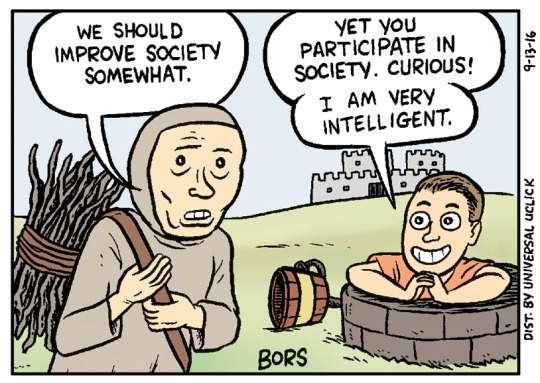
[Image ID: Matt Bors’s classic Mr Gotcha panel, in which a medieval peasant says ‘We should improve society somewhat,’ and Mr Gotcha replies, ‘Yet you participate in society. Curious! I am very smart.’]
This is the mindset Matt Bors skewers so expertly with his iconic Mr Gotcha character: “Yet you participate in society. Curious! I am very smart”:
https://thenib.com/mister-gotcha/
(Which reminds me, I am halfway through Bors’s unbelievably, fantastically, screamingly awesome graphic novel “Justice Warriors,” which turns the neoliberal caveat-emptor/personal-responsibility brain-worm into the basis for possibly the greatest superhero comic of all time:)
https://www.mattbors.com/books
Watts finishes his review with:
I’ve never fully come to terms with the general decency of Cory’s characters. Doctorow the activist lives in the trenches, fighting those who make their billions trading the details of our private lives, telling us that they own what we’ve bought, surveilling us for the greater good and even greater profits. He’s spent more time facing off against the world’s powerful assholes than I ever will. He knows how ruthless they are. He knows, first-hand, how much of the world is clenched in their fists. By rights, his stories should make mine look like Broadway musicals.
And yet, Doctorow the Author is — hopeful. The little guys win against overwhelming odds. Dystopias are held at bay. Even the bad guys, in defeat, are less likely to scorch the earth than simply resign with a show of grudging respect for a worthy opponent.
I often get asked by readers — especially readers of Pluralistic, which is heavy on awful scandals and corruption — how I keep going. Watts has the answer:
Maybe it’s a fundamental difference in outlook. I’ve always regarded humans as self-glorified mammals, fighting endless and ineffective rearguard against their own brain stems; Cory seems to see us as more influenced by the angels of our better natures. Or maybe — maybe it’s not just his plots that are meant to be instructional. Maybe he’s deliberately showing us how we could behave as a species, in the same way he shows us how to fuck with DRM or foil face-recognition tech. Maybe it’s not that he subscribes to some Pollyanna vision of what we are; maybe he’s showing us what we could be.
Got it in one, Peter.
And…
It’s also about what happens if we don’t get better.
Writing on his “Economics From the Top Down” blog, Blair Fix — a heterodox economist and sharp critic of oligarchy — publishes a Red Team Blues review that nails the “or else” in my books, and does it with graphs:
https://economicsfromthetopdown.com/2023/05/13/red-team-blues-cory-doctorows-anti-finance-thriller/
Fix surfaces the latent point in my work that inequality is destabilizing — that spectacular violence is downstream of making a society that has nothing to offer for the majority of us. As Marty Hench, the 67 year old forensic accountant protagonist of Red Team Blues says,
Finance crime is a necessary component of violent crime. Even the most devoted sadist needs a business model, or he will have to get a real job.
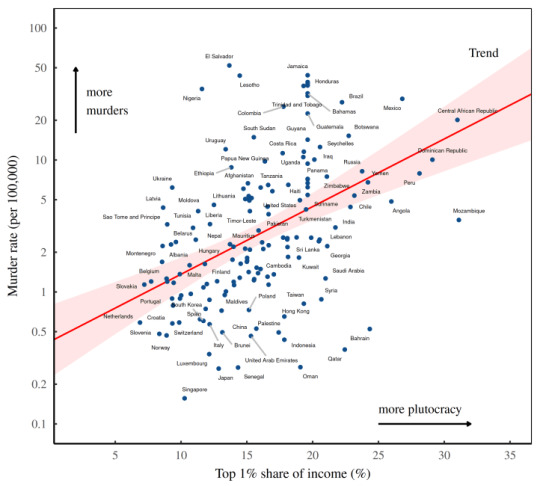
[Image ID: A chart labeled, ‘With more plutocracy comes more murder. As countries become more unequal (horizontal axis), their murder rates go up (vertical axis).’]
Fix agrees, and shows us that murders go up with inequality.
https://economicsfromthetopdown.com/2023/05/13/red-team-blues-cory-doctorows-anti-finance-thriller/#sources-and-methods
Which is why, while the average private eye is a kind of “cop who gets to bend the rules of policing”; Hench is “a kind of uber IRS agent who gets to work in ‘sneaky ways that aren’t available to the taxman.’”
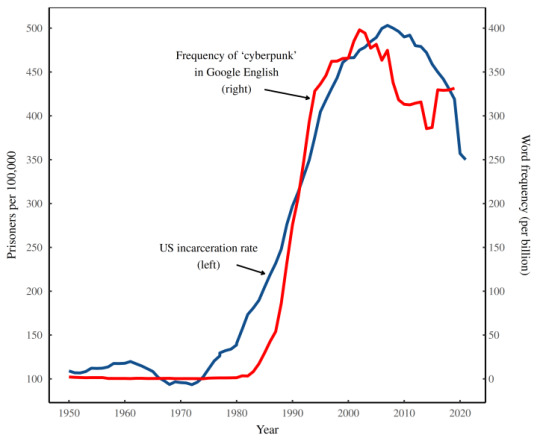
[Image ID: A chart labeled, ‘Was the US prison state the inspiration for cyberpunk? The term ‘cyberpunk’ (which describes a genre of dystopian science fiction) became popular in tandem with mass incarceration in the US. It’s probably not a coincidence.’]
This observation segues into a fascinating, data-informed look at the way that science fiction reflects our fears and aspirations about wider social phenomenon — for example, the popularity of the word “cyberpunk” closely tracks rising incarceration rates.
https://economicsfromthetopdown.com/2023/05/13/red-team-blues-cory-doctorows-anti-finance-thriller/#sources-and-methods
(It’s not a coincidence that the next Marty Hench book, “The Bezzle,” is about prisons and prison-tech; it’s out in Feb 2024:)
https://us.macmillan.com/books/9781250865878/thebezzle
I’m out on tour with Red Team Blues right now, with upcoming stops in the DC area, Toronto, the UK, and then Berlin:
https://craphound.com/novels/redteamblues/2023/04/26/the-red-team-blues-tour-burbank-sf-pdx-berkeley-yvr-edmonton-gaithersburg-dc-toronto-hay-oxford-nottingham-manchester-london-edinburgh-london-berlin/
I’ve just added another Berlin stop, on June 8, at Otherland, Berlin’s amazing sf/f bookstore:
https://twitter.com/otherlandberlin/status/1657082021011701761
I hope you’ll come along! I’ve been meeting a lot of people on this tour who confess that while they’ve read my blogs and essays for years, they’ve never picked up one of my books. If you’re one of those readers, let me assure you, it is not too late!
As you’ve read above, my fiction is very much a continuation of my nonfiction by other means — but it’s also the place where I bring my hope as well as my dismay and anger. I’m told it makes for a very good combination.
If you’re still wavering, maybe this will sway you: the blogging and essays are either free or very low-paid, and they’re heavily subsidized by my fiction. If you enjoy my nonfiction, buying my novels is the best way to say thank you and to ensure a continuing supply of both.
But novels are by no means a dreary duty — fiction is a delight, and after a couple decades at it, I’ve come to grudgingly concede — impostor syndrome notwithstanding — that I’m pretty good at it.
I hope you’ll agree.
Image:
Robert Miller (modified)
https://www.flickr.com/photos/12463666@N03/52721565937
CC BY 2.0
https://creativecommons.org/licenses/by/2.0/

Catch me on tour with Red Team Blues in Toronto, DC, Gaithersburg, Oxford, Hay, Manchester, Nottingham, London, and Berlin!


[Image ID: A kitchen junk-drawer, full of junk.]
#illustration#pluralistic#hand-waving#multi-party computation#linkdump#link-blogging#red team blues#uefi#supply chain attacks#xkcd#brain fog#say cyber again#privacy without monopoly#reviews#crypto-wars#inequality#social instability#blair fix#maria farrell#dicksenian#msi#villains#peter watts#global south#bennett cyphers#eff#data protection#content moderation#content moderation at scale#content moderation at scale is impossible
22 notes
·
View notes
Text










WIP... The Vaux Villages, colloquially known as Vaux Street. The floor plan is the same for both villages. I love this build so much. It will not be fully furnished because it's already a beast as it is right now. There are two sub levels and three above ground levels. Nine residential and four community units in each village.
It's the origin of the Vaux Street Allstars, but also features in Keystone and We Got Us, so you'll get to see many of the different parts of this behemoth as the stories go.
[lore under the cut]
The Vaux Villages are the result of a social experiment that was developed by The Venango Group in the late 1910s and was implemented in the mid 1920s. The goal was to observe how citizens of various socioeconomic strata and racial/cultural/religious backgrounds interacted with each other when there were no land-forms, bodies of water, or man-made structures to demarcate class, caste, or cash.
The experiment officially lasted 53 years, about two generations. Initially, the county was behind it, but as times and leadership changed, The Venango Group were afforded less and less privileges and encountered more and more ordinances that restricted what they were allowed to do.
It all started in the late 1950s, when the permit approvals for the 3rd and 4th villages were delayed again and again. Then it was one thing after another. The final straw was a zoning ordinance that was put on the books in the mid 1970s that prohibited non-educational research in that area. As the group was not affiliated with a scholastic institution, they would be in violation of the ordinance if they continued.
The one saving grace for the families that lived there and the community they nurtured was that the edifices and the land they were built upon were part of an irrevocable, ironclad trust, so try as they might, the county could not reduce the villages to rubble and the lives of those who dwelt within along with them.
These days, The Venango Group still manages the property, and rather than by selection, residency is inherited or gifted. In cases where the resident does not declare the recipient before departure, succession laws are followed or recommendations are voted on by the community.
#ts4 build#wip#ts4 screenshots#simblr#sims 4 build#black simblr#keystone#keystone wips#show us your builds#showusyourbuilds#ts4 builds#keystone lore#keystone builds
11 notes
·
View notes